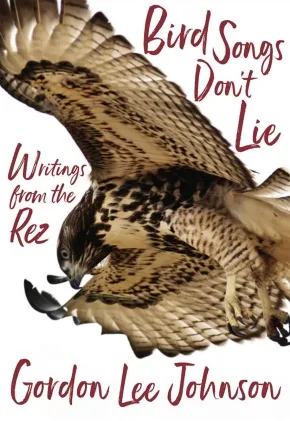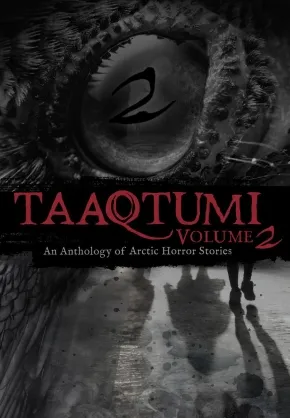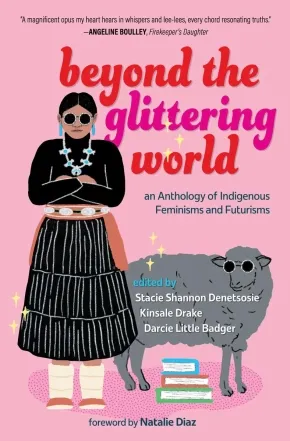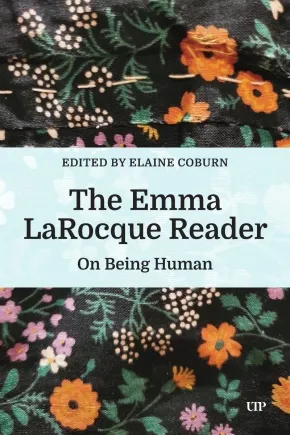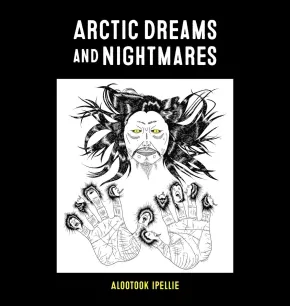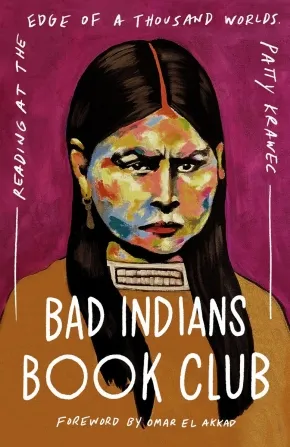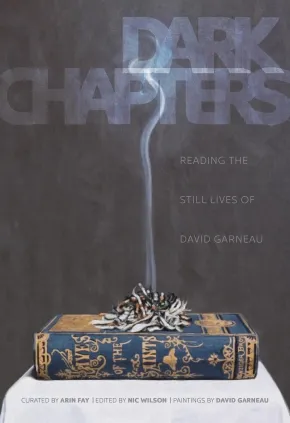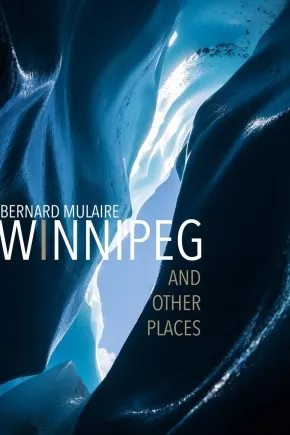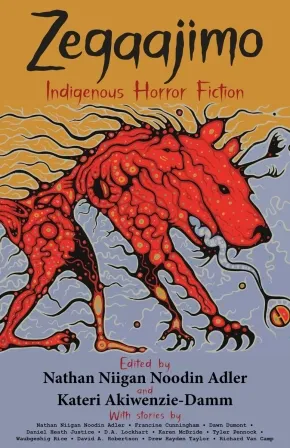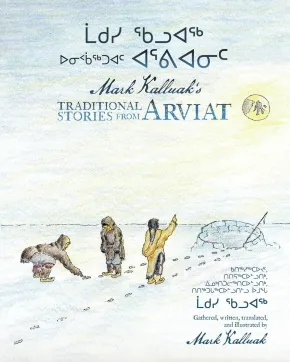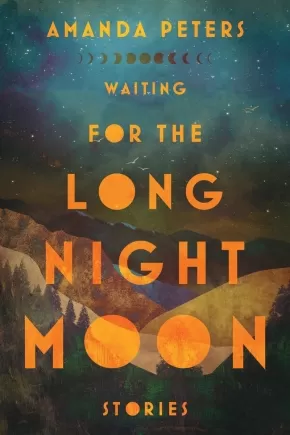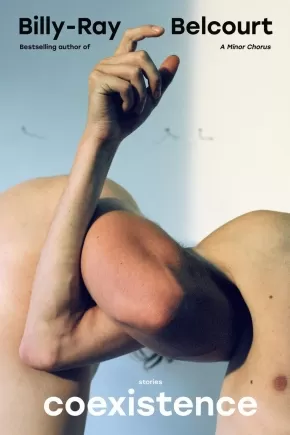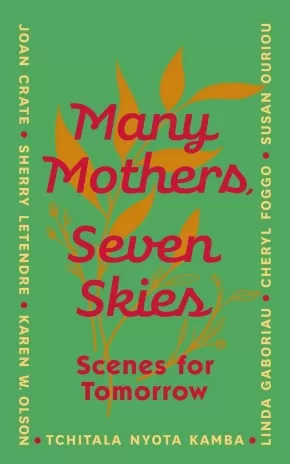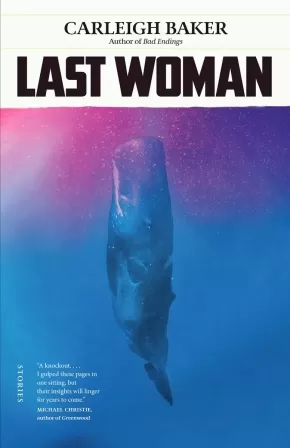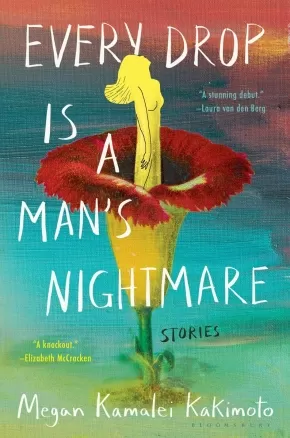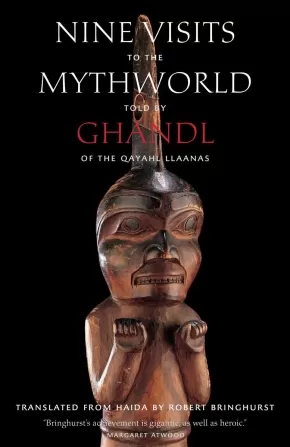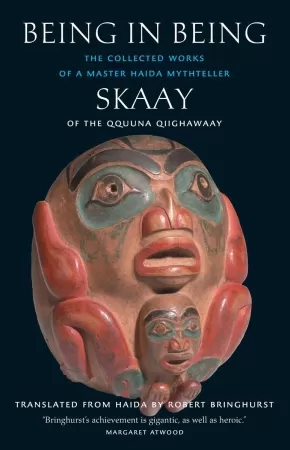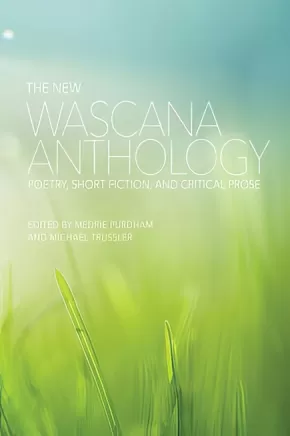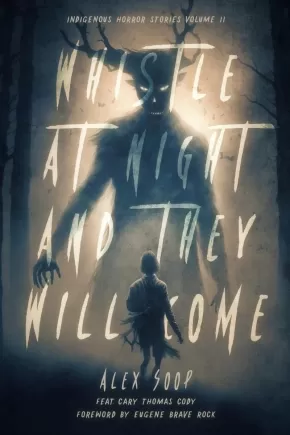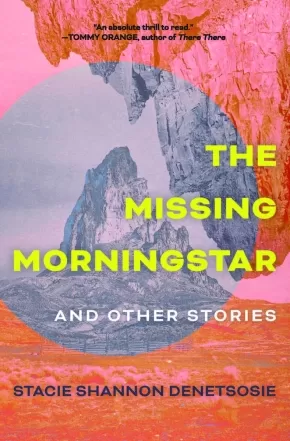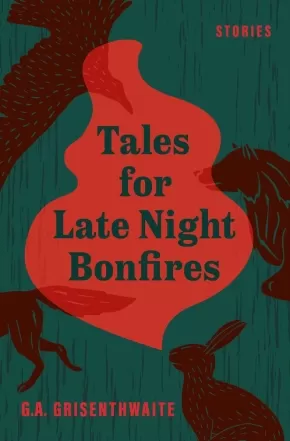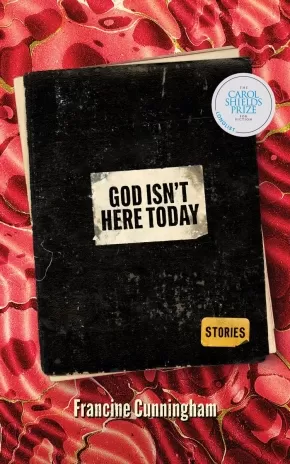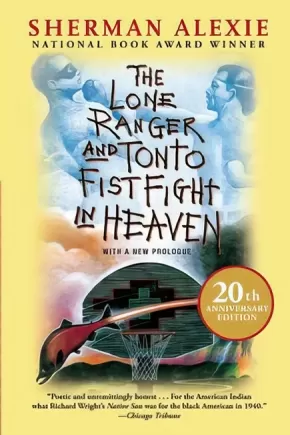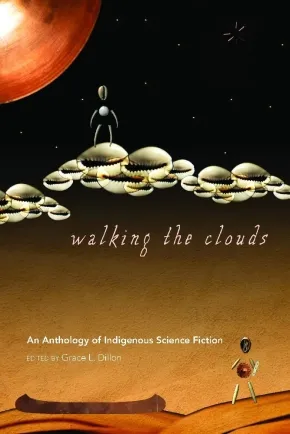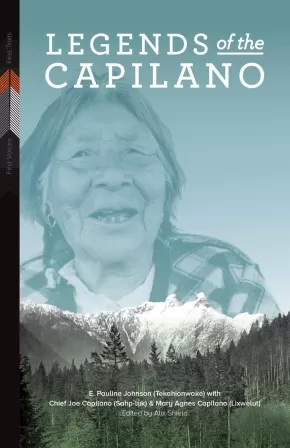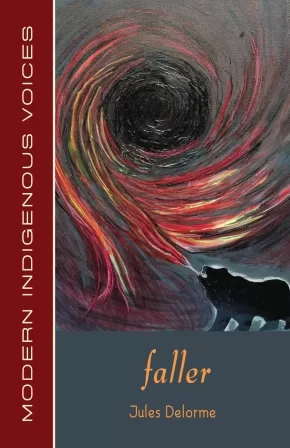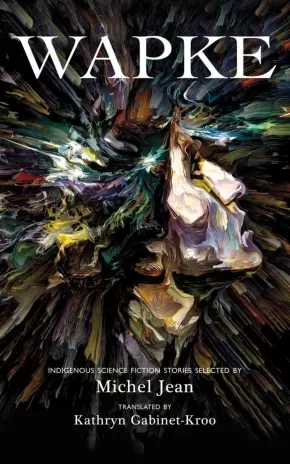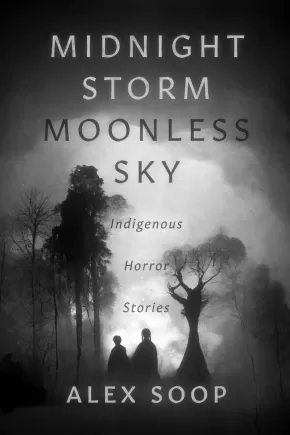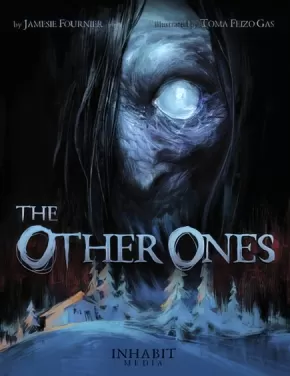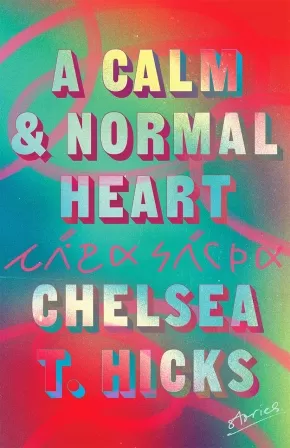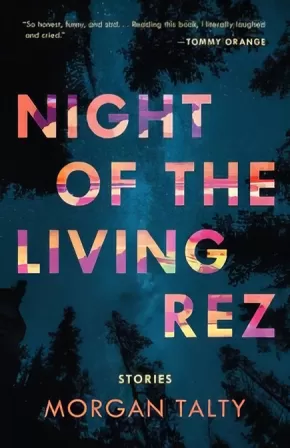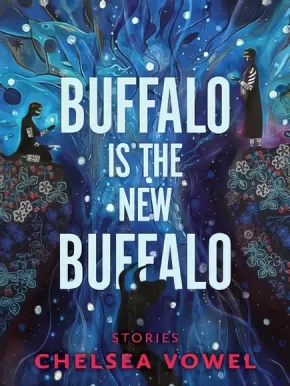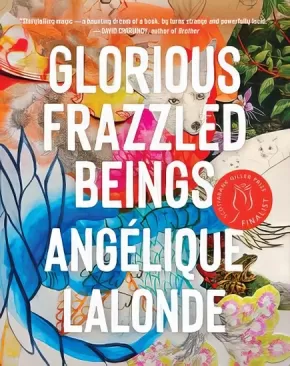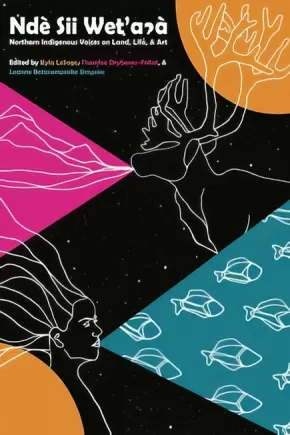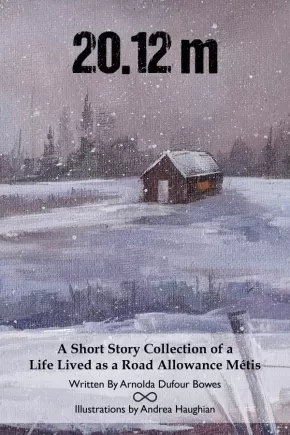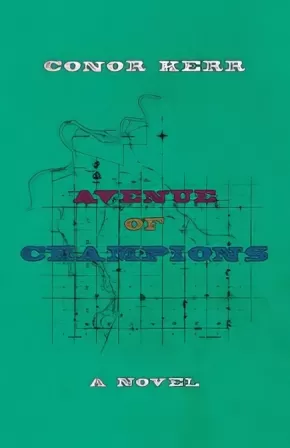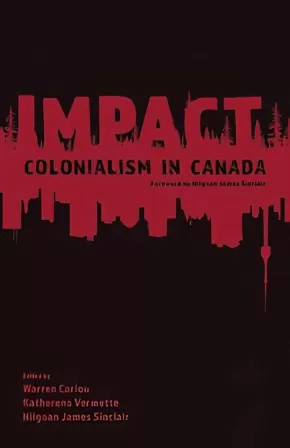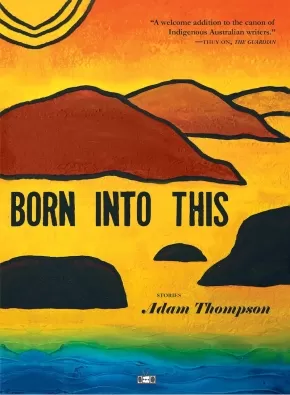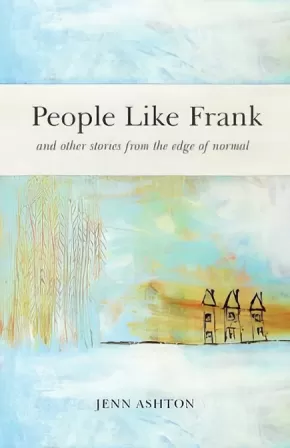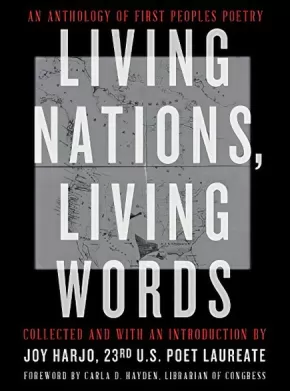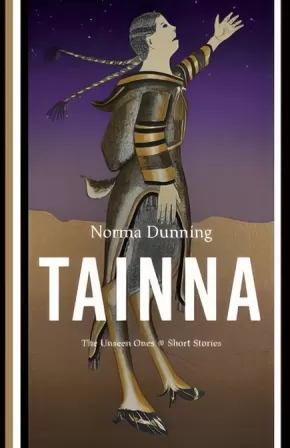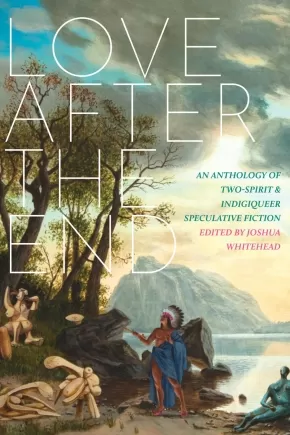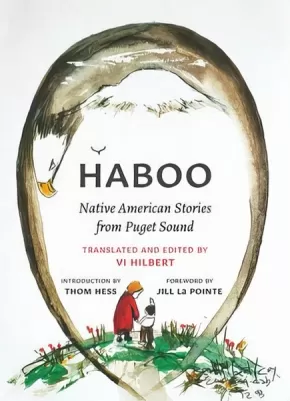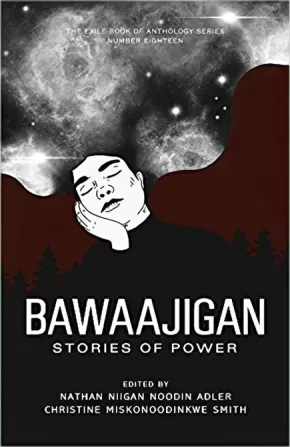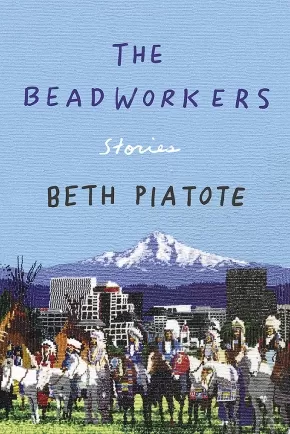
Anthologies / Short Stories
1
-
15
of
87 Results;
Sort By
Go To
of 6
Bird Songs Don't Lie: Writings from the Rez
$33.95
Format:
Paperback
Text Content Territories:
Indigenous American; Native American; Cahuilla; Cupeño (Kuupangaxwichem);
Reading Level: N/A
ISBN / Barcode: 9781597147170
Synopsis:
Synopsis:
Essays and short stories from a celebrated Cupeño/Cahuilla journalist.
"Johnson is by turns tender and hilarious—as ever. This book is a welcome addition to his loving history of the world as he knows it." —Susan Straight, author of Sacrament
In this moving collection of short stories and essays, Gordon Lee Johnson (Cupeño/Cahuilla) cements his voice not only as a commentator on American Indian reservation life but also as a master of fiction writing. From the noir-tinged mystery of "Unholy Wine" to the gripping intensity of "Tukwut," Johnson effortlessly switches genre and perspective, vividly evoking people and places that are fictional but profoundly true to life. Johnson’s nonfiction is equally revelatory in its exploration of connections between past and present. Whether examining his own conflicted feelings toward the missions as a source of both cultural damage and identity or sharing advice on cooking for eight dozen cowboys and -girls, Johnson plumbs the comedy, catastrophe, and beauty of his life on the Pala Reservation to thunderous effect.
Reviews
"Gordon Johnson's voice is like no other, and he continues in this new book to send out missives from his place in the world—the beating-strong heart of southern California's first peoples and the land they've loved for generations. Johnson is by turns tender and hilarious—as ever. This book is a welcome addition to his loving history of the world as he knows it." —Susan Straight, author of Sacrament
"A delicious communal feast of memory and imagination for California Indians or for anyone who has spent time living among us; on every page, there is a sensory connection to people, places, and events to delight the senses, evoke a smile, and trigger more stories about traditional gatherings, summer softball tournaments, elders who have passed on, or the bone-rattling comfort from hearing bird songs wafting through the summer air all night long." —Dr. Theresa Gregor (Iipay Nation of Santa Ysabel), CSU Long Beach
Additional Information
240 pages | 5.50" x 8.00" | Paperback
Taaqtumi 2: An Anthology of Arctic Horror Stories
$22.95
Format:
Paperback
Text Content Territories:
Indigenous Canadian; Inuit;
Grade Levels: 12; University/College;
ISBN / Barcode: 9781772275834
Synopsis:
Synopsis:
This new collection of horror short fiction weaves together contemporary Arctic settings with ancient monsters and mysterious beings that have been said to stalk the tundra for centuries.
Featuring authors from across the Canadian Arctic, this new volume of Taaqtumi—an Inuktitut word that means “In the Dark”—reveals just how horrifying the dark can be.
Featuring new fiction from award-winning authors Aviaq Johnston, Rachel and Sean Qitsualik-Tinsley and Jamesie Fournier, as well as new voices in the genre, this collection is perfect for any horror lover.
Educator & Series Information
Includes stories from Indigenous authors across the Canadian Arctic.
This book is part of the Taaqtumi series.
Additional Information
184 pages | 6.00" x 9.00" | b&w illustrations | Paperback
Beyond the Glittering World: An Anthology of Indigenous Feminisms and Futurisms
$29.50
Format:
Paperback
Text Content Territories:
Indigenous American; Native American;
Reading Level: N/A
ISBN / Barcode: 9798890920300
Synopsis:
Synopsis:
From adventures in Indigenous futurism to tales of first love, the stories and poems of Beyond the Glittering World proclaim and celebrate a rising generation of Native American storytellers.
Beyond the Glittering World brings together twenty emerging and established Native women writers and writers of marginalized genders, including Moniquill Blackgoose, Heid E. Erdrich, A.J. Eversole, Chelesa Hicks, and D. Daye Hunter. Immersing readers in worlds as varied as their authors, this collection presents an array of singular voices at their genre-bending, boundary-breaking, devastating, and joyous best.
Reviews
"An evocative compilation of voices pondering Indigenous futures and the shape of Indigenous love. Beyond the Glittering World holds a healthy dose of gender-bending, genre-challenging, future-hoping might. This anthology is a welcome addition to the field of Indigenous anthologies.”—DEBORAH JACKSON TAFFA, Whiskey Tender
Additional Information
240 pages | 5.25" x 8.00" | Paperback
The Emma LaRocque Reader: On Being Human
$39.95
Editors:
Format:
Paperback
Text Content Territories:
Indigenous Canadian; Métis;
Reading Level: N/A
ISBN / Barcode: 9781487551889
Synopsis:
Synopsis:
Emma LaRocque was born in 1949 in Lac La Biche into a Cree-speaking Métis family. She grew up in a one-room, kerosene-lit log cabin built by her father. At the age of nine, she fought her parents to attend school, where she encountered English and the colonizer’s harmful stereotypes of Indigenous peoples. Confronting the contradictions of colonialism sparked her journey as a writer and scholar, as she sought to understand the dissonance between her identity and the world around her.
The Emma LaRocque Reader is a comprehensive collection of her most significant writings, poetry and prose, offering an intimate window into the mind of one of Canada’s foremost Indigenous scholars. Through her work, LaRocque provides profound insights into the intersections of colonialism, sexism, and racism in Canada, while also critically celebrating the beauty of her community and culture. In the afterword, she reflects on fifty years of challenging the colonial enterprise. A vital contribution to postcolonial literature, The Emma LaRocque Reader intertwines the personal and the political to explore what it means to be human, offering a powerful testament to Indigenous resistance, resilience, and vision.
This collection brings together the works of Métis scholar Emma LaRocque, offering a half-century of her poetry and prose, and shedding new light on Canada, colonialism, and Indigenous resistance.
Educator Information
Chapters
Foreword by Armand Ruffo
Preface by Elaine Coburn
Acknowledgments by Emma LaRocque
Acknowledgments of Permissions to Reprint
Introduction by Elaine Coburn
1975 A Personal Essay on Poverty (Excerpt from Defeathering the Indian)
1983 The Métis in English Canadian Literature
1988 On the Ethics of Publishing Historical Documents
1989 Racism Runs through Canadian Society
1990 Preface: Here Are Our Voices: Who Will Hear?
1990 Geese (poem)
1990 Nostalgia (poem)
1990 “Progress” (poem)
1990 The Red in Winter (poem)
1990 Incongruence (poem)
1990 Loneliness (poem)
1990 Beggar (poem)
1990 Tides, Towns, and Trains
1992 My Hometown, Northern Canada, South Africa (poem)
1993 Violence in Aboriginal Communities
1994 Long Way from Home (poem)
1996 The Colonization of a Native Woman Scholar
1996 When the Other Is Me: Native Writers Confronting Canadian Literature
2001 Native Identity and the Métis: Otehpayimsuak Peoples
2001 From the Land to the Classroom
2004 When the Wild West Is Me
2006 Sweeping (poem)
2006 Sources of Inspiration: The Birth of "For the Love of Words": Aboriginal Writers of Canada
2007 Métis and Feminist
2009 Reflections on Cultural Continuity through Aboriginal Women’s Writings
2010 Native Writers Reconstruct: Pushing Paradigms
2013 For the Love of Place – Not Just Any Place: Selected Métis Writings
2015 “Resist No Longer”: Reflections on Resistance Writing and Teaching
2016 Contemporary Métis Literature: Resistance, Roots, Innovation
2016 Colonialism Lived
2017 Powerlines (poem)
2022 Wehsakehcha, Comics, Shakespeare, and the Dictionary
2023 Afterword
Index
Additional Information
348 pages | 6.00" x 9.00" | Paperback
Arctic Dreams and Nightmares
$21.95
Format:
Paperback
Text Content Territories:
Indigenous Canadian; Inuit;
Reading Level: N/A
ISBN / Barcode: 9781772275643
Synopsis:
Synopsis:
Utilizing intricately blended visual and written imagery, Arctic Dreams and Nightmares takes the reader on an Arctic journey interpreted through the mythological and contemporary world of an Inuit artist and author. Containing twenty short stories with accompanying pen ink drawings, it is the first publication to exclusively feature the writing and artwork of Alootook Ipellie. At the time of its original publication in 1993, Arctic Dreams and Nightmares was one of the few books to be written by an Inuk in Canada, and became a landmark in the emerging discipline of Inuit literature.
Additional Information
160 pages | 8.75" x 9.25" | Paperback
Bad Indians Book Club: Reading at the Edge of a Thousand Worlds
$26.00
Format:
Paperback
Text Content Territories:
Indigenous Canadian; First Nations; Anishinaabeg; Ojibway; Lac Seul;
Reading Level: N/A
ISBN / Barcode: 9781773104614
Synopsis:
Synopsis:
In this powerful reframing of the stories that make us, Anishinaabe writer Patty Krawec leads us into the borderlands to ask: What worlds do books written by marginalized people describe and invite us to inhabit?
Patty Krawec doesn’t want to be a “Good Indian.” When a friend asked what books could help them understand Indigenous lives, Patty Krawec gave them a list. This list then exploded into a book club, then into a podcast about a year of Indigenous reading, and then, ultimately, into this book.
Drawing on conversations with readers and authors, Bad Indians Book Club delves into writing about history, science, and gender, and into memoirs and fiction, all by “Bad Indians” and those like them, whose refusal of the dominant narrative of the wemitigoozhiwag (European settlers) opens up new possibilities for identity and existence.
Introducing each chapter with flash fiction about a shapeshifting Deer Woman, who is on her own journey to decide who she is, Krawec leads us into a place of wisdom and medicine where stories of and by marginalized writers help us imagine a thousand worlds waiting to be born.
Reviews
“Bad Indians Book Club is a compendium of worlds. From a lifetime of reading, there emerges a marriage of tapestry and map, a vision of the literary canon not as some secret handshake of the correctly educated but as a living, growing organism. . . There’s a dangerousness to a book like this. It’s not enough to define the Good Indian, the Grateful Immigrant, the Untroublesome Minority. Nor is it enough to simply reject these designations. One must interrogate how they came to hold so much power, how they offer the willing participant so many crumbs of reward from colonialism’s table.”— Omar El Akkad, author of One Day, Everyone Will Have Always Been Against This, September 2025
“Bad Indians Book Club is like a kind and protective auntie guiding you through a sometimes hostile world with sheer wisdom and wit. It’s a resounding rallying cry for our stories and our peoples. There’s no other book club I’d want to be in!”— Waubgeshig Rice, author of Moon of the Turning Leaves, September 2025
“This genre-crossing, shape-shifting, imagination-expanding book is for all who love to, and also need to, read. We tell stories to live, and this enlivening book reflects on all kinds of stories, each page suffused with Patty Krawec’s unmistakable voice and generous, timeless wisdom.”— Astra Taylor, author of The Age of Insecurity: Coming Together as Things Fall Apart, September 2025
“I didn’t want the Bad Indians Book Club to end. I read it at the perfect time, when snow was on the ground, in a period of rest and renewal. Patty Krawec made me wonder and made me ponder. Her book is a call to action to be curious, vigilant, to listen to and receive the inner strength of the land, to create and recreate community, to agitate, to investigate, to take story into ourselves and to hold the teachings sacred. As she guides us, throughout the book she tells us a new, sustaining, serial story about Kwe, Deer Woman. Such a gift. There is so much goodness in The Bad Indians Book Club!”— Shelagh Rogers, Shelagh Rogers, Truth and Reconciliaton Commission Honorary Witness, recovering broadcast journalist, September 2025
“Bad Indians Book Club is full of good medicine — challenging us to ask questions and bringing us home to ourselves. As Patty Krawec guides us into the deep wisdom wells of many people who journey in kinship, we consider how to hold the curiosity of care and stories, and what it means to imagine and create a future that integrates all our stories into a web of healing. Please buy this book, and celebrate the power of story in a weary yet flourishing world.”— Kaitlin B. Curtice, author of Living Resistance, September 2025
“In Bad Indians Book Club, Patty Krawec provides critical space for the ne'er-do-wells, disrupters, red sheep, box-busters, tricksters, and all us rowdy relatives defying expectations. Indigenous people have always been proverbial thorns in the sides of colonizers, and this piercing book does an incredible job of letting the air out of today’s imperialist narratives.”— Taté Walker, Two Spirit Lakota storyteller and community-builder, September 2025
“With Bad Indians Book Club, Patty Krawec gifts us a compelling investigation into the power of not just reading books but also doing so in community. Krawec makes the case for building your circle through reading, as a way of being in better relations with all our kin, including the land. Thinking deeply alongside other books, Bad Indians Book Club is a needed guide at a moment when books are under attack. Books are not just written culture, they are also oral culture, and Krawec illuminates this beautifully.”— Chanda Prescod-Weinstein, author of The Disordered Cosmo, September 2025
Additional Information
232 pages | 6.00" x 9.00" | Paperback
Dark Chapters: Reading the Still Lives of David Garneau
$32.95
Artists:
Editors:
● Arin Fay
Format:
Paperback
Text Content Territories:
Indigenous Canadian; Métis;
ISBN / Barcode: 9781779400536
Synopsis:
Synopsis:
A singular collection of responses to the still life paintings of acclaimed artist David Garneau
Dark Chapters brings together 17 poets, fiction writers, curators, and critics to engage with the works of David Garneau, the Governor General’s Award-winning Métis artist. Featuring paintings from Garneau’s still life series “Dark Chapters” alongside poetry, fiction, critical analysis, and autotheory, the book includes contributions from Fred Wah, Paul Seesequasis, Jesse Wente, Lillian Allen, Billy-Ray Belcourt, Larissa Lai, Susan Musgrave, and more.
A nod to the Reports of Truth and Reconciliation Commission, in which Justice Murray Sinclair describes the residential school system as “one of the darkest, most troubling chapters in our nation’s history,” Garneau’s still life paintings combine common objects (books, bones, teacups, mirrors) and less familiar ones (a Métis sash, a stone hammer, a braid of sweetgrass) to reflect the complexity of contemporary Indigenous experiences. Provocative titles like “Métis in the Academy” and “Smudge Before Reading” invite consideration of the mixed influences and loyalties faced by Indigenous students and scholars. Other paintings explore colonialism, vertical and lateral violence, Christian influence on traditional knowledge, and museum treatment of Indigenous belongings.
Rooted in Garneau’s life-long engagement at the intersections of visual art and writing, Dark Chapters presents a multifaceted reflection on the work of an inimitable, unparalleled artist.
Includes contributions from Arin Fay, Billy-Ray Belcourt, Cecily Nicholson, David Howes, Dick Averns, Fred Wah, Jeff Derksen, Jesse Wente, John G. Hampton, Larissa Lai, Lillian Allen, Paul Seesequasis, Peter Morin, Rita Bouvier, Susan Musgrave, Tarene Thomas, and Trevor Herriot.
Reviews
“A smart collection of art and essays, Dark Chapters activates deep conversations about art, resistance, and sovereignty. Visiting with paintings by Métis artist David Garneau, seventeen poets, curators, and thinkers offer complex provocations that trouble and activate new forms of communities and relationships.” —Dr. Carmen Robertson, Canada Research Chair in North American Indigenous Visual and Material Culture
“Provocative, probing, and precarious, Dark Chapters pairs the poetic, literary, political, and critical responses of seventeen authors with the deceptively uncluttered yet gravid and combustible still lifes of David Garneau. This collection of pictures and words undertakes a necessary examination of the uncanny oppositions and disquieting literal and symbolic inversions that signify and animate the Indigenous history of Canada.” —Bonnie Devine
“Dark Chapters is a lesson in relationality and innovation. Built through conversations between Garneau’s work and artists/writers, the intergenerational contributors to this book come together in relation to Garneau and his still lives to explore the important contribution the artist has made to Canadian, Indigenous, and International art.” —Erin Sutherland
Educator Information
Table of Contents
Foreword
Nic Wilson
Still Life
John G. Hampton
Stone and Rock: I Have Failed You
Peter Morin
Wander Carried
Cecily Nicholson
On Kinship
Paul Seesequasis
Learning from Indigenous Academic Solidarity
Jeff Derksen
Knock Knock
Lillian Allen
Unsettling the Colonial Gaze
Trevor Herriot
Smudge Before Reading and The Land Does Not Forget
Tarene Thomas
Confession (after David Garneau) by Rita Bouvier
Fuse and Formal and Informal Education
Jesse Wente
The Problem with Pleasure
Billy-Ray Belcourt
Métis Realism: On the Materiality of Smoke and Relationality of Rocks
David Howes
Allies (after Hsieh and Montano)
Larissa Lai
Ally Tear Reliquary
Arin Fay
Understanding Attempted Enlightening: Between Language as Power…and Light as Life
Dick Averns
Spine
Fred Wah
The Resting Heartbeat of a Wounded Bird
Susan Musgrave
Gallery
About the Artist
About the Curator
About the Editor
About the Contributors
List of Artworks
Index
Additional Information
160 pages | 6.50" x 9.50" | 58 colour illustrations | Paperback
Winnipeg: and Other Places
$9.95
Format:
Paperback
Reading Level: N/A
ISBN / Barcode: 9781998779604
Synopsis:
Synopsis:
Winnipeg and Other Places / Winnipeg et ailleurs is a back-to-back bilingual collection of short stories which read as sketches or snapshots of the author’s wanderings. Seen through the author’s subjective lenses, no two people have the same recollection of the past or of what just happened. Memory, loss, and longing are shaped by the author’s native Winnipeg and wherever else fate has taken him.
Educator Information
Bilingual: English and French.
Additional Information
75 pages | 3.00" x 5.00" | Paperback
Zegaajimo: Indigenous Horror Fiction
$28.00
Format:
Paperback
Text Content Territories:
Indigenous Canadian;
Reading Level: N/A
ISBN / Barcode: 9781928120445
Synopsis:
Synopsis:
A brand-new, spine-chilling collection of horror/thriller fiction, Zegaajimo, Anishinaabemowin for "to tell a scary story," includes stories from eleven leading First Nations and Metis authors from across the territories of Canada: Nathan Niigan Noodin Adler, Dawn Dumont, Daniel Heath Justice, D.A. Lockhart, Karen McBride, Tyler Pennock, Waubgeshig Rice, David A. Robertson, Drew Hayden Taylor, and Richard Van Camp.
Many of the stories draw on Traditional Stories. These stories of supernatural settings and deadful dees are more than speculative fiction, they are also reminders that monsters are already in our midst, that the known can be just as frightening as the unknown, and that the slightest mistakes can have dire consequences.
The collection is co-edited by Nathan Niigan Noodin Adler and Kateri Akiwenzie-Damm. Thrilling horror, Indigenous-style, perfect for Halloween!
Additional Information
230 pages | 5.50" x 8.50" | Paperback
Mark Kalluak's Traditional Stories from Arviat
$39.95
Artists:
Format:
Hardcover
Text Content Territories:
Indigenous Canadian; Inuit;
Reading Level: N/A
ISBN / Barcode: 9781772275117
Synopsis:
Synopsis:
Mark Kalluak was a respected community leader and Inuktitut specialist who was passionate about sharing Inuit culture. This book is a compilation of Kalluak’s works on traditional Inuit stories and beliefs from his home community of Arviat, Nunavut. These tales and cultural outlooks were thoughtfully collected, written in Inuktitut and English, and illustrated by Kalluak. From the origins of darkness and light, to cautionary tales of how to treat others, to explanations of taboos, this book is a noteworthy collection of traditional Inuit stories and beliefs.
Additional Information
216 pages | 8.00" x 10.00" | Hardcover
Waiting for the Long Night Moon: Stories
$24.99
Format:
Paperback
Text Content Territories:
Indigenous Canadian; First Nations; Mi'kmaq;
Reading Level: N/A
ISBN / Barcode: 9781443468220
Synopsis:
Synopsis:
In her debut collection of short fiction, Amanda Peters describes the Indigenous experience from an astonishingly wide spectrum in time and place—from contact with the first European settlers, to the forced removal of Indigenous children, to the present-day fight for the right to clean water.
In this intimate collection, Peters melds traditional storytelling with beautiful, spare prose to describe the dignity of the traditional way of life, the humiliations of systemic racism and the resilient power to endure. A young man returns from residential school only to realize he can no longer communicate with his own parents. A young woman finds purpose and healing on the front lines as a water protector. An old man remembers his life as he patiently waits for death. And a young girl nervously dances in her first Mawi’omi. The collection also includes the story “The Berry Pickers,” which inspired Peters’ critically acclaimed novel of the same name, as well as the Indigenous Voices Award–nominated story “Pejipug (Winter Arrives).”
At times sad, sometimes disturbing but always redemptive, the stories in Waiting for the Long Night Moon will remind you that where there is grief there is also joy, where there is trauma there is resilience and, most importantly, there is power.
Educator Information
Waiting for the Long Night Moon is a collection of short stories.
Additional Information
256 pages | 6.00" x 9.00" | Paperback
Coexistence: Stories (HC) (2 in Stock)
$29.95
Format:
Hardcover
Text Content Territories:
Indigenous Canadian;
Reading Level: N/A
ISBN / Barcode: 9780735242036
Synopsis:
Synopsis:
A collection of intersecting stories about Indigenous love and loneliness from one of contemporary literature’s most boundless minds.
Across the prairies and Canada’s west coast, on reserves and university campuses, at literary festivals and existential crossroads, the characters in Coexistence are searching for connection. They’re learning to live with and understand one another, to see beauty and terror side by side, and to accept that the past, present, and future can inhabit a single moment.
An aging mother confides in her son about an intimate friendship from her distant girlhood. A middling poet is haunted by the cliché his life has become. A chorus of anonymous gay men dispense unvarnished truths about their sex lives. A man freshly released from prison finds that life on the outside has sinister strictures of its own. A PhD student dog-sits for his parents at what was once a lodging for nuns operating a residential school—a house where the spectre of Catholicism comes to feel eerily literal.
Bearing the compression, crystalline sentences, and emotional potency that have characterized his earlier books, Coexistence is a testament to Belcourt’s mastery of and playfulness in any literary form. A vital addition to an already rich catalogue, this is a must-read collection and the work of an author at the height of his powers.
Reviews
“Belcourt is one of the finest and most sublime writers at work today. This book is a feat of beauty and compression, every sentence reinventing the reader. It’s like entering a quiet room or a secret lake. It’s about our coexistence with lovers, kin, enemies, but also our coexistence with desire, solitude, and an intelligence that in itself is a form of hunger—language as solace, language as light. Belcourt is the rare writer who composes from, to, and because of the soul. It’s been some time since I loved a book so deeply.”—Claudia Dey, author of Daughter
“Through the interconnected lifeworlds contained in Coexistence, we hear a defiantly loving and astoundingly honest response to colonial and racial violence. Billy-Ray Belcourt has written an homage and an elegy to a still-unfolding history—as intimate and hopeful as young romance, as mysterious and life-giving as family. I adore this collection.” —Tsering Yangzom Lama, author ofWe Measure the Earth with our Bodies
“Coexistence filled my heart and lifted my spirit. There are few writers who can authentically capture the beauty and complexity of Indigenous existence both on the rez and in the city like Billy-Ray Belcourt. This book is a resolute proclamation of resilient Indigenous humanity and the nuance and richness we all embody. The stories weave and enrich on journeys that are both familiar and informative. Coexistence is a powerful celebration and a gift to the world.” —Waubgeshig Rice, author of Moon of the Turning Leaves
“Billy-Ray Belcourt masterfully portrays the complexities of Indigenous lives, longing, and belonging through these stories. There are sentences in this collection that I didn’t know I had been waiting to read; my breath caught on several of them. I suspect that readers will be letting out collective sighs while reading this book.”—Helen Knott, author of Becoming a Matriarch
“Billy-Ray Belcourt’s Coexistence is a brilliant exploration of the boundaries both imposed and imagined that exist between beings and the spaces we inhabit. I wildly admire Belcourt’s crisp prose and remarkable insights, yet what haunts me most about these powerful stories is the author’s heart-blasted willingness to be vulnerable on the page. This engaging, alive text drills right to heart of what it is to be Indigenous in the twenty-first century.”—Mona Susan Power, author of A Council of Dolls
Additional Information
200 pages | 5.00" x 7.50" | Hardcover
Many Mothers, Seven Skies: Scenes for Tomorrow
$16.95
Format:
Paperback
Text Content Territories:
Indigenous Canadian;
Reading Level: N/A
ISBN / Barcode: 9781990601521
Synopsis:
Synopsis:
A diverse group of seven writers comes together to create seven tender scenes about their hopes for the future.
The Many Mothers Collective came together during the pandemic, hoping to make sense of the world they found themselves in. What evolved was their need to not only focus on the present moment, but on the world they will leave behind for their children and grandchildren, and for seven generations to come. In seven scenes for the stage, the members of the collective explore the past, where they come from, and the future, where they are going, with a deep sense of hopefulness rooted in resistance.
Additional Information
70 pages | 5.00" x 8.00" | Paperback
Last Woman: Stories
$24.95
Format:
Paperback
Text Content Territories:
Indigenous Canadian;
Reading Level: N/A
ISBN / Barcode: 9780771004148
Synopsis:
Synopsis:
From one of the country’s most celebrated new writers, a blistering collection of short fiction that is bracingly relevant, playfully irreverent, and absolutely unforgettable.
There’s a hole in the ozone layer. Are teenage girls to blame?
Floods and wildfires, toxic culture, billionaires in outer space, or a purse-related disaster while on mushrooms—in today’s hellscape world, there’s no shortage of things to worry about. Last Woman, the new collection of short fiction by award-winning author Carleigh Baker, wants you to know that you’re not alone. In these 13 brilliant new stories, Baker and her perfectly-drawn characters are here for you—in fact, they’re just as worried and weirded-out as everyone else.
A woman’s dream of poetic solitude turns out to be a recipe for loneliness. A retiree is convinced that his silence is the only thing that will prevent a deadly sinkhole. An emerging academic wakes up and chooses institutional violence. A young woman finds sisterhood in a strange fertility ritual, and an enigmatic empath is on a cleanse. Baker’s characters are both wildly misguided and a product of the misguided times in which we live. Through them we see our world askew and skewered—and, perhaps, we can begin to see it anew.
Carleigh Baker’s signature style is irreverent, but her heart is true—these stories delve into fear for the future, intergenerational misunderstandings, and the complexities of belonging with sharp wit and boundless empathy. With equal parts compassion and critique, she brings her clear-eyed attention to bear on our world, and the results are hilarious, heartbreaking, and startling in their freshness.
Reviews
“Carleigh Baker’s Last Woman is a knockout. These fifteen stories are probing contemplations on technology, the climate crisis, childhood, adulthood, parenthood, dreams, identity, creativity, and those staggering moments when the uncanny burbles up through the cracks of everyday experience. I gulped these pages in one sitting, but their insights will linger for years to come.”—Michael Christie, author of Greenwood
“Carleigh Baker’s Last Woman is a satirical, energetic look at our messed-up world. The stories in this collection ask original, surprising what-if questions, exploring disasters small and large, personal and public, and the past, present, and future of this planet—and beyond. I’m so impressed with Baker’s ability to craft such a range of voices, by turns funny and vulnerable and exuberant and idiosyncratic. These stories are inventive, a little weird, and very, very cool.”—Shashi Bhat, author of The Most Precious Substance on Earth
Additional Information
208 pages | 5.18" x 8.00" | Paperback
Every Drop a Man’s Nightmare
$36.99
Format:
Hardcover
Text Content Territories:
Indigenous Hawaiian;
ISBN / Barcode: 9781639731169
Synopsis:
Synopsis:
From major new storytelling talent Megan Kamalei Kakimoto, a blazing, bodily, raucous journey through contemporary Hawaiian identity and womanhood.
Megan Kamalei Kakimoto's wrenching and sensational debut story collection follows a cast of mixed native Hawaiian and Japanese women through a contemporary landscape thick with inherited wisdom and the ghosts of colonization. This is a Hawai'i where unruly sexuality and generational memory overflow the postcard image of paradise and the boundaries of the real, where the superstitions born of the islands take on the weight of truth.
A childhood encounter with a wild pua'a (pig) on the haunted Pali highway portends one young woman's fraught relationship with her pregnant body. An elderly widow begins seeing her deceased lover in a giant flower. A kanaka writer, mid-manuscript, feels her raw pages quaking and knocking in the briefcase.
Every Drop Is a Man's Nightmare is both a fierce love letter to Hawaiian identity and mythology, and a searing dispatch from an occupied territory threatening to erupt with violent secrets.
Megan Kamalei Kakimoto's wrenching and sensational debut story collection follows a cast of mixed native Hawaiian and Japanese women through a contemporary landscape thick with inherited wisdom and the ghosts of colonization. This is a Hawai'i where unruly sexuality and generational memory overflow the postcard image of paradise and the boundaries of the real, where the superstitions born of the islands take on the weight of truth.
A childhood encounter with a wild pua'a (pig) on the haunted Pali highway portends one young woman's fraught relationship with her pregnant body. An elderly widow begins seeing her deceased lover in a giant flower. A kanaka writer, mid-manuscript, feels her raw pages quaking and knocking in the briefcase.
Every Drop Is a Man's Nightmare is both a fierce love letter to Hawaiian identity and mythology, and a searing dispatch from an occupied territory threatening to erupt with violent secrets.
Reviews
"The contemporary Hawaii of Kakimoto’s debut is neither idyllic backdrop nor tragic fable; the stories evoke the land and its intermixing cultures in all their anxiety, claustrophobia and restlessness . . . Weaving Hawaiian words into English ones, Kakimoto positions language as a tether to our most ancient and eternal selves . . . Every Drop Is a Man’s Nightmare is rich and wise, humming with confidence in the knowledge of a particular community’s lovely, miserable ways." - The New York Times Book Review
"The contemporary Hawaii of Kakimoto’s debut is neither idyllic backdrop nor tragic fable; the stories evoke the land and its intermixing cultures in all their anxiety, claustrophobia and restlessness . . . Weaving Hawaiian words into English ones, Kakimoto positions language as a tether to our most ancient and eternal selves . . . Every Drop Is a Man’s Nightmare is rich and wise, humming with confidence in the knowledge of a particular community’s lovely, miserable ways." - The New York Times Book Review
"It would be fitting but too simple to call this collection haunting. The stories in Megan Kamalei Kakimoto’s Every Drop Is a Man’s Nightmare are so lavishly imagined, and their characters—from young women to mythical beings to watchful ancestors and even Hawaii itself—are so defiant, that to offer any solid definitions seems like a betrayal of the book’s ethics. Here, boundaries between the past and present, the living and the dead, are not so much flimsy as nonexistent . . . Even after one closes the book, the power of these stories remains." —Washington Independent Review of Books
“Megan Kamalei Kakimoto is a short story writer that all other short story writers should study. She has the ability to captivate readers with a single sentence. Her prose bursts with exquisite confidence that makes it hard to believe this is a debut collection. Every Drop is a frontrunner for Book of the Year.” —Debutiful
“Kakimoto interweaves themes of sexual desire and fertility with Hawaiian mythology in her unflinching debut collection . . . Marked by a wry sense of humor and an unerring touch for the surreal, Kakimoto's stories add up to a powerful exploration of gender, class, race, colonialism, and domestic violence. This eloquent outing marks Kakimoto as a writer to watch.” —Publishers Weekly, starred review
Additional Information
| 272 pages | 5.51" x 8.25" |
Nine Visits to the Mythworld: Told by Ghandl of the Qayahl Llaanas
$26.95
Format:
Paperback
Text Content Territories:
Indigenous Canadian; First Nations; Haida;
Reading Level: N/A
ISBN / Barcode: 9781771623773
Synopsis:
Synopsis:
In the Fall of 1900, a young American anthropologist named John Swanton arrived in the Haida country, on the Northwest Coast of North America, intending to learn everything he could about Haida mythology. He spent the next ten months phonetically transcribing several thousand pages of myths, stories, histories and songs in the Haida language. Swanton met a number of fine mythtellers during his year in the Haida country. Each had his own style and his own repertoire. Two of them—a blind man in his fifties by the name of Ghandl, and a septuagenarian named Skaay—were artists of extraordinary stature, revered in their own communities and admired ever since by the few specialists aware of their great legacy.
Nine Visits to the Mythworld includes all the finest works of one of these master mythtellers. In November 1900, when Ghandl dictated these nine stories, the Haida world lay in near ruins. Wave upon wave of smallpox and other diseases, rapacious commercial exploitation by fur traders, whalers and miners, and relentless missionization by the church had taken a huge toll on Haida culture. Yet in the blind poet’s mind, the great tradition lived, and in his voice it comes alive. Robert Bringhurst’s eloquent and vivid translations of these works are supplemented by explanatory notes that supply the needed background information.
Additional Information
224 pages | 5.50" x 8.50" | b&w photographs | Paperback
Being in Being: The Collected Works of a Master Haida Mythteller
$29.95
Format:
Paperback
Text Content Territories:
Indigenous Canadian; First Nations; Haida;
Reading Level: N/A
ISBN / Barcode: 9781771623759
Synopsis:
Synopsis:
Being in Being contains three masterpieces by legendary Haida mythteller Skaay of the Qquuna Qiighawaay. The shortest recounts the high points of the legend of his family. The second, Raven Travelling, is the longest and most complex version of the story of the Raven ever recorded on the Northwest Coast. The third is The Qquuna Cycle, a narrative poem of nearly 5,500 lines, one of the true masterpieces of North American literature. Robert Bringhurst’s eloquent and vivid translations of these works are supplemented by explanatory notes that supply the needed background information.
Additional Information
384 pages | 5.50" x 8.50" | Paperback
The New Wascana Anthology: Poetry, Short Fiction, and Critical Prose
$49.50
Editors:
Format:
Paperback
Text Content Territories:
Indigenous Canadian;
ISBN / Barcode: 9780889773080
Synopsis:
Synopsis:
The New Wascana Anthology is named for the Cree word "oskana," meaning "bones,"* but this anthology is no literary graveyard. It will introduce you to stories, poems, and essays that can be discussed over drinks, or used to impress friends years after leaving English 100 behind.
Offering a taster's choice of the best Canadian writing, with a special focus on Aboriginal and Prairie writers, this anthology includes pieces selected to introduce you to the English literary canon. Going back hundreds of years, the oldest poems included here have no known author, while the youngest writer is a recent university graduate.
Building on the bones of the canon (including all of Canada's Man Booker Prize-winners and newest Nobel Laureate), The New Wascana Anthology features writers such as Flannery O'Connor, Thomas King, Carmine Starnino, and Ursula K. Le Guin who will challenge your worldview. Most importantly, this anthology is about turning the page, opening your mind, and revelling in the pleasures of reading.
*The bones referred to are the bones of plains bison, a species that once numbered in the tens of millions on the Great Plains.
Educator Information
Contains works from Indigenous and non-Indigenous writers.
Table of Contents
Preface
Poetry
Anonymous
Summer is icumen in
Sir Patrick Spens
Mary Hamilton
Geoffrey Chaucer (ca. 1343–1400)
from The Canterbury Tales
Excerpts from General Prologue
Sir Thomas Wyatt (1503–1542)
The Long Love, That in My Thought Doth Harbour
Sir Walter Ralegh (ca. 1552–1618)
The Nymph’s Reply to the Shepherd
Edmund Spenser (ca. 1552–1599)
from Amoretti
30. My love is like to ice
75. One day I wrote her name
Sir Philip Sidney (1554–1586)
from Astrophel and Stella
59. Dear, why make you more of a dog than me?
Michael Drayton (1563–1631)
from Idea
61. Since there’s no help, come let us kiss and part
Christopher Marlowe (1564–1593)
The Passionate Shepherd to His Love
William Shakespeare (1564–1616)
from Sonnets
18. Shall I compare thee to a summer’s day?
20. A woman’s face, with nature’s own hand painted
116. Let me not to the marriage of true minds
130. My mistress’ eyes are nothing like the sun
from As You Like It
All the world’s a stage
John Donne (1572–1631)
A Valediction: Forbidding Mourning
Death be not proud
The Bait
The Flea
Ben Jonson (1572–1637)
Epigram XXII: On My First Daughter
Epigram XLV: On My First Son
Song: To Celia
George Herbert (1593–1633)
Love (III)
John Milton (1608–1674)
When I Consider How My Light Is Spent
from Paradise Lost, Book 1
The Invocation
Anne Bradstreet (1612–1672)
Before the Birth of One of Her Children
The Author to Her Book
Andrew Marvell (1621–1678)
To His Coy Mistress
Anne Finch, Countess of Winchelsea (1661–1720)
To the Nightingale
A Letter to Daphnis, April 2, 1685
Alexander Pope (1688–1744)
The Rape of the Lock
Lady Mary Wortley Montagu (1689–1762)
Addressed to—
Thomas Gray (1716–1771)
Elegy Written in a Country Churchyard
Christopher Smart (1722–1771)
from Jubilate Agno
My Cat Jeoffry
William Blake (1757–1827)
from Songs of Innocence
The Chimney Sweeper
The Lamb
from Songs of Experience
A Poison Tree
London
The Chimney Sweeper
William Wordsworth (1770–1850)
A slumber did my spirit seal
Composed Upon Westminster Bridge, September 3, 1802
I wandered lonely as a cloud
The world is too much with us
Samuel Taylor Coleridge (1772–1834)
Kubla Khan
George Gordon, Lord Byron (1788–1824)
She Walks in Beauty
The Destruction of Sennacherib
Percy Bysshe Shelley (1792–1822)
Ozymandias
John Keats (1795–1821)
La Belle Dame Sans Merci
When I have fears that I may cease to be
Alfred, Lord Tennyson (1809–1892)
Ulysses
Robert Browning (1812–1889)
Porphyria’s Lover
My Last Duchess
Emily Brontë (1818–1848)
Remembrance
Walt Whitman (1819–1892)
When Lilacs Last in the Dooryard Bloom’d
Matthew Arnold (1822–1888)
Dover Beach
George Meredith (1828–1909)
from Modern Love
17. At dinner, she is hostess, I am host
Emily Dickinson (1830–1866)
F479. Because I could not stop for Death
F591. I heard a Fly buzz—when I died
F620. Much Madness is divinest Sense
F1096. A narrow Fellow in the Grass
F1263. Tell all the Truth but tell it slant
Lewis Carroll (1832–1898)
Jabberwocky
Thomas Hardy (1840–1928)
The Ruined Maid
The Convergence of the Twain
The Workbox
Gerard Manley Hopkins (1844–1889)
God’s Grandeur
Pied Beauty
The Windhover
A. E. Housman (1859–1936)
from A Shropshire Lad
XIX. To An Athlete Dying Young
Sir Charles G. D. Roberts (1860–1943)
Tantramar Revisited
Archibald Lampman (1861–1899)
Heat
William Butler Yeats (1865–1939)
The Second Coming
Leda and the Swan
Crazy Jane Talks with the Bishop
Edwin Arlington Robinson (1869–1935)
Miniver Cheevy
Robert Frost (1874–1963)
After Apple-Picking
Mending Wall
Nothing Gold Can Stay
The Silken Tent
William Carlos Williams (1883–1963)
The Red Wheelbarrow
This is Just to Say
Pictures from Brueghel
D. H. Lawrence (1885–1930)
Piano
Snake
Ezra Pound (1885–1972)
In a Station of the Metro
The River Merchant’s Wife: A Letter
Isaac Rosenberg (1890–1918)
Break of Day in the Trenches
Edna St. Vincent Millay (1892–1950)
Elegy before Death
What lips my lips have kissed
Wilfred Owen (1893–1918)
Dulce et Decorum Est
e.e. cummings (1894–1963)
“next to of course god america i
anyone lived in a pretty how town
F. R. Scott (1899–1985)
Lakeshore
Langston Hughes (1902–1967)
The Negro Speaks of Rivers
Harlem
A. J. M. Smith (1902–1980)
The Lonely Land
Far West
Stevie Smith (1902–1971)
Not Waving but Drowning
Earle Birney (1904–1995)
Anglo-Saxon Street
W. H. Auden (1907–1973)
Musée des Beaux-Arts
Theodore Roethke (1908–1963)
My Papa’s Waltz
A. M. Klein (1909–1972)
Heirloom
The Rocking Chair
Dorothy Livesay (1909–1996)
Green Rain
Elizabeth Bishop (1911–1979)
In the Waiting Room
Irving Layton (1912–2006)
The Birth of Tragedy
Dylan Thomas (1914–1953)
Fern Hill
Do Not Go Gentle into That Good Night
P. K. Page (1916–2010)
After Rain
Planet Earth
Robert Lowell (1917–1977)
For the Union Dead
Miriam Waddington (1917–2004)
Advice to the Young
Raymond Souster (1921–2012)
The Lilac Poem
Elizabeth Brewster (1922–2012)
The Night Grandma Died
Eli Mandel (1922–1992)
Houdini
Anne Szumigalski (1926–1999)
It Wasn’t a Major Operation
Don Coles (b. 1927)
Collecting Pictures
Robert Kroetsch (1927–2011)
Meditation on Tom Thomson
Rita Joe (1932–2007)
Axe Handles for Sale
I Lost My Talk
Sylvia Plath (1932–1963)
Daddy
Alden Nowlan (1933–1983)
The Bull Moose
Leonard Cohen (b. 1934)
A Kite Is a Victim
Suzanne
Robert Currie (b. 1937)
Young Boy, Fleeing
Glen Sorestad (b. 1937)
Ten Years
Now That I’m Up
John Newlove (1938–2003)
The Double-Headed Snake
Margaret Atwood (b. 1939)
Backdrop Addresses Cowboy
The Nature of Gothic
This Is a Photograph of Me
Seamus Heaney (1939–2013)
Bog Queen
Digging
The Names of the Hare
Patrick Lane (b. 1939)
Mountain Oysters
Gary Hyland (1940–2011)
from Arguments in the Garden of Prayer
1. So many frogs
14. The first sounds
Beth Brant (b. 1941)
for all my Grandmothers
Robert Hass (b. 1941)
Consciousness
Gwendolyn MacEwen (1941–1987)
Manzini: Escape Artist
Marie Annharte Baker (b. 1942)
Pretty Tough Skin Woman
Louise Glück (b. 1943)
Illuminations
Michael Ondaatje (b. 1943)
The Cinnamon Peeler
White Dwarfs
Dennis Cooley (b. 1944)
how there in the plaid light she played with his affections plied them spikes from his heart she stood by pliers in hand he has his pride
Craig Raine (b. 1944)
A Martian Sends a Postcard Home
Tom Wayman (b. 1945)
Did I Miss Anything?
Linda Hogan (b. 1947)
Cities Behind Glass
Lorna Crozier (b. 1948)
The Dirty Thirties
Poem about Nothing
from The Sex Lives of Vegetables
Radishes
Lettuce
Cauliflower
Beth Cuthand (b. 1949)
Four Songs for the Fifth Generation
Kathleen Wall (b. 1950)
Morning Nocturne
Joy Harjo (b. 1951)
She Had Some Horses
Gerald Hill (b. 1951)
Becoming and Going: An Oldsmobile Story
Di Brandt (b. 1952)
completely seduced
Louise Halfe (b. 1953)
She Told Me
Louise Erdrich (b. 1954)
Dear John Wayne
Indian Boarding School: The Runaways
Jacklight
Jeanette Lynes (b. 1956)
The Last Interview with Bettie Page
Anne Simpson (b. 1956)
Grammar Exercise
George Elliott Clarke (b. 1960)
Blank Sonnet
Michael Crummey (b. 1965)
Her Mark
Gregory Scofield (b. 1966)
His Flute, My Ears
Karen Solie (b. 1966)
Parasitology
Randy Lundy (b. 1967)
Bear
Ghost Dance
Stephanie Bolster (b. 1969)
To Dolly
Carmine Starnino (b. 1970)
Pepino’s Poem, “Growing Up in Naples”
Rope Husbandry
Daniel Scott Tysdal (b. 1978)
Metro
Cassidy McFadzean (b. 1989)
I smile earwide
Short Fiction
Sherman Alexie (b. 1966)
The Approximate Size of My Favourite Tumour
Margaret Atwood (b. 1939)
My Last Duchess
Sandra Birdsell (b. 1942)
Disappearances
Raymond Carver (1938–1988)
Cathedral
William Faulkner (1897–1962)
A Rose for Emily
Richard Ford (b. 1944)
Sweethearts
Charlotte Perkins Gilman (1860–1935)
The Yellow Wall-paper
James Joyce (1882–1941)
Araby
Thomas King (b. 1943)
A Seat in the Garden
Ursula K. Le Guin (b. 1929)
The Ones Who Walk Away from Omelas
Alexander MacLeod (b. 1972)
Miracle Mile
Alistair MacLeod (1936-2014)
The Boat
Katherine Mansfield (1888–1923)
The Garden-Party
Yann Martel (b. 1963)
The Facts Behind the Helsinki Roccamatios
Rohinton Mistry (b. 1952)
Swimming Lessons
Ken Mitchell (b. 1940)
The Great Electrical Revolution
Alice Munro (b. 1931)
The Bear Came over the Mountain
Flannery O’Connor (1925–1964)
A Good Man Is Hard to Find
Edgar Allan Poe (1809–1849)
The Cask of Amontillado
Eden Robinson (b. 1968)
Traplines
Gloria Sawai (1932–2011)
The Day I Sat with Jesus on the Sundeck and a Wind Came Up and Blew My Kimono Open and He Saw My Breasts
Guy Vanderhaeghe (b. 1951)
Dancing Bear
Dianne Warren (b. 1950)
Bone Garden
Critical Prose
Stephen Jay Gould (1941–2002)
Evolution as Fact and Theory
Trevor Herriot (b. 1958)
from Grass, Sky, Song: Promise and Peril in the World of Grassland Birds
A Way Home
Barbara Kingsolver (b. 1955)
Setting Free the Crabs
Don McKay (b. 1942)
Baler Twine: Thoughts on Ravens, Home, and Nature Poetry
Jonathan Swift (1667–1745)
A Modest Proposal
Copyright Notices
Index of Authors and Titles
Index of First Lines of Poetry
Additional Information
554 pages | 6.00" x 9.00" | Paperback
Whistle at Night and They Will Come: Indigenous Horror Stories Volume 2
$29.95
Format:
Paperback
Text Content Territories:
Indigenous Canadian;
ISBN / Barcode: 9781990735301
Synopsis:
Synopsis:
In this followup to his hugely popular Midnight Storm Moonless Sky: Indigenous Horror Stories, Blackfoot storyteller Alex Soop plunges us again into enthralling tales that mix reality with dark terror. Within its stories, Whisper at Night and They Will Come reveals ancient theories of the paranormal, post apocalyptic scenarios, impossible wells of grief, and monstrous phobias. Soop scares the wits out of readers, all the while uncovering overlooked social anxieties and racism affecting Indigenous Peoples across North America.
Educator & Series Information
This is the second volume in the Indigenous Horror series.
Additional Information
276 pages | 5.50" x 8.50" | Paperback
Never Whistle at Night: An Indigenous Dark Fiction Anthology: Are You Ready to Be Un-Settled?
$25.00
Editors:
Format:
Paperback
Text Content Territories:
Indigenous American; Indigenous Canadian;
Reading Level: N/A
ISBN / Barcode: 9781039003798
Synopsis:
Synopsis:
A bold, clever, and sublimely sinister collection that dares to ask the question: “Are you ready to be un-settled?” Featuring stories by:
Norris Black • Amber Blaeser-Wardzala • Phoenix Boudreau • Cherie Dimaline • Carson Faust • Kelli Jo Ford • Kate Hart • Shane Hawk • Brandon Hobson • Darcie Little Badger • Conley Lyons • Nick Medina • Tiffany Morris • Tommy Orange • Mona Susan Power • Marcie R. Rendon • Waubgeshig Rice • Rebecca Roanhorse • Andrea L. Rogers • Morgan Talty • D.H. Trujillo • Theodore C. Van Alst Jr. • Richard Van Camp • David Heska Wanbli Weiden • Royce Young Wolf • Mathilda Zeller
Many Indigenous people believe that one should never whistle at night. This belief takes many forms: for instance, Native Hawaiians believe it summons the Hukai’po, the spirits of ancient warriors, and Native Mexicans say it calls Lechuza, a witch that can transform into an owl. But what all these legends hold in common is the certainty that whistling at night can cause evil spirits to appear—and even follow you home.
These wholly original and shiver-inducing tales introduce readers to ghosts, curses, hauntings, monstrous creatures, complex family legacies, desperate deeds, and chilling acts of revenge. Introduced and contextualized by bestselling author Stephen Graham Jones, these stories are a celebration of Indigenous peoples’ survival and imagination, and a glorious reveling in all the things an ill-advised whistle might summon.
Reviews
“All combined, these powerful pages use fantastical elements to create very human characters who suffer very real horrors, like oppression, poverty, abuse, mental illness and the erasure of long-existing cultures and traditions. This volume is a must for any library collection and will be devoured by speculative fiction fans who enjoy a sprinkle of social commentary within their scary books.” —Booklist
“Never Whistle at Night is all I’ve ever wanted in an Indigenous horror anthology. From doubles, to Empty People, to story theft, to zombies, this anthology explores the horror that lives in colonial violence, generational love and trauma, and our everyday lives. It’s a joy to see such a diverse representation of experience, background, and style in this carefully curated and terrifying collection.”—Jessica Johns, author of Bad Cree
“Story to story, Never Whistle at Night never failed to surprise, delight, and shock me. I’m a big fan of stories that make you feel like you’re standing at the edge of a cliff with a stranger’s fingers on the tip of your spine—and this anthology has that ungoverned, go-for-broke aesthetic that I love.”—Nick Cutter, author of Little Heaven
“An extensive collection of Indigenous stories ranging from the humorous to the terrifying, this anthology is a must-read for everyone. Your new favorite author is absolutely in this book.”—Amina Akhtar, author of Kismet
“Melodious, haunting, and visceral, Never Whistle at Night enchants from the very start with fiery confidence and merciless ghosts. These are stories that dig their fingers inside you and carve something truly special. An absolute must-read.”—Hailey Piper, Bram Stoker Award-winning author of Queen of Teeth
"Can you draw power from the spirit of a story? If the twenty-six tales in the essential Never Whistle at Night anthology are any indication, the answer is an emphatic yes. The title itself provides its own warning, but I'll go one step further: Never read this collection of spine-chilling stories alone at night. You just might not make it to morning."—Clay McLeod Chapman, author of Ghost Eaters
Additional Information
416 pages | 5.19" x 8.00" | Paperback
The Missing Morningstar: And Other Stories
$25.95
Format:
Paperback
Text Content Territories:
Indigenous American; Native American; Navajo (Diné);
Reading Level: N/A
ISBN / Barcode: 9781948814850
Synopsis:
Synopsis:
In The Missing Morningstar and Other Stories, Stacie Denetsosie confronts long-reaching effects of settler-colonialism on Native lives in a series of gritty, wildly imaginative stories. A young Navajo man catches a ride home alongside a casket he’s sure contains his dead grandfather. A gas station clerk witnesses the kidnapping of the newly crowned Miss Northwestern Arizona. A young couple’s search for a sperm donor raises questions of blood quantum. This debut collection grapples with a complex and painful history alongside an inheritance of beauty, ceremony, and storytelling.
Reviews
“The Missing Morningstar is full of voices that reveal grief and redemption. This collection is a compelling compendium of family, truths, loss and love. Denetsosie’s voice is a wonderful addition to contemporary fiction that explores Indigenous lives. I loved it.”—Brandon Hobson
Additional Information
144 pages | 5.25" x 8.00" | Paperback
Tales for Late Night Bonfires
$22.95
Format:
Paperback
Text Content Territories:
Indigenous Canadian; First Nations; Salish; Interior Salish; Nlaka'pamux (Thompson);
Reading Level: N/A
ISBN / Barcode: 9781990601378
Synopsis:
Synopsis:
Curious, uncanny tales blending Indigenous oral storytelling and meticulous style, from an electric voice in Canadian fiction.
These are stories that are a little bit larger than life, or maybe they really happened. Tales that could be told 'round the campfire, each one-upping the next. Tales about a car that drives herself, ever loyal to her owner. Tales about an impossible moose hunt. Tales about the Real Santa(TM) mashed up with the book of Genesis, alongside SPAM stew and bedroom sets from IKEA.
G.A. Grisenthwaite's writing is electric and inimitable, blending meticulous literary style with oral storytelling and coming away with a voice that is entirely his own. Tales for Late Night Bonfires is truly one of a kind, and not to be missed.
Reviews
"Tales for Late Night Bonfires is funny, dark, and rich all at once; each story is immense and alive. Grisenthwaite shows us what fiction can be when story leads the way." - QUILL & QUIRE starred review
"With his first book, Home Waltz, G.A. Grisenthwaite had arrived. With Tales for Late Night Bonfires, he has fully moved in. His writing is so vivid and fresh that the reader inhabits his characters, in their homes, on the land, in their talking cars. Gord has a great gift for dialogue and he writes with flinty humour and such love. I felt more completely human when I finished this book." - SHELAGH ROGERS founding host and co-creator, The Next Chapter, CBC Radio
"Grisenthwaite is a master storyteller, with a voice capable of roasting us and all the other ‘two-leggeds’ while keeping us at the bonfire, hungry for more. The lives of these unforgettable characters are at once comic and heart-crushing, precarious and buoyed by the undying embrace of interlaced dimensions, imbricate worlds." - SUSAN HOLBROOK author of Throaty Wipes and Ink Earl
"Gordon has a voice that is authentic campfire. I felt like I was holding a mug of tea in one hand, and enjoying a fish fry with the other - while waiting for his words to paint a vibrant canvas of characters. Sitting around the campfire, and ingesting memory with stories that need to be told, and retold. These stories visit places in the heart, where we each share, words that need to be said, words that beg to be read." - CAROL ROSE GOLDENEAGLE author of Bearskin Diary and Essential Ingredients
Additional Information
232 pages | 5.25" x 8.00" | Paperback
God Isn't Here Today
$20.95
Format:
Paperback
Text Content Territories:
Indigenous Canadian;
Reading Level: N/A
ISBN / Barcode: 9781988784908
Synopsis:
Synopsis:
For fans of Chuck Palahniuk, Joyce Carol Oates, and Karen Russell, God Isn’t Here Today ricochet between form and genre, taking readers on a dark, irreverent, yet poignant journey led by a unique and powerful new voice.
Driven by desperation into moments of transformation, Cunningham’s characters are presented with moments of choice—some for the better and some for the worse. A young man goes to God’s office downtown for advice; a woman discovers she is the last human on Earth; an ice cream vendor is driven insane by his truck’s song; an ageing stripper uses undergarments to enact her escape plan; an incubus tires of his professional grind; and a young woman inherits a power that has survived genocide, but comes with a burden of its own.
Even as they flirt with the fantastic, Cunningham’s stories unfold with the innate elegance of a spring fern, reminding us of the inherent dualities in human nature—and that redemption can arise where we least expect it.
Reviews
"Each of the stories is quite different from the other, but many are connected by themes of death and transformation and a fragrant throughline of lemon and lavender. ... The stories contain a distinct viscerality: hemoglobin and skin grafts, fantasies of rough sex and bondage, ice cream melting down forearms, and a DIY trepanation. ...God Isn’t Here Today may appeal to fans of Joshua Whitehead, Chuck Palahniuk, and the trash cinema of John Waters."—Shantell Powell Cloud Lake Literary
"God Isn't Here Today is a collection, I feel, that is whispered in the calligraphy of ghosts. Cunningham continues to both astound and haunt all who discover her. Wow!"—Richard Van Camp, author of The Lesser Blessed
Additional Information
248 pages | 5.00" x 8.00" | Paperback
The Lone Ranger and Tonto Fistfight in Heaven - 20th Anniversary Edition
$24.50
Format:
Paperback
Text Content Territories:
Indigenous American; Native American; Salish; Interior Salish; Spokane;
ISBN / Barcode: 9780802121998
Synopsis:
Synopsis:
Sherman Alexie’s celebrated first collection, The Lone Ranger and Tonto Fistfight in Heaven, established its author as one of America’s most important and provocative voices. The basis for the award-winning movie Smoke Signals, it remains one of his best loved and widely praised books twenty years after its initial publication.
Vividly weaving memory, fantasy, and stark reality to paint a portrait of life in and around the Spokane Indian reservation, this book introduces some of Alexie’s most beloved characters, including Thomas Builds-the-Fire, the storyteller who no one seems to listen to, and his compatriot, Victor, the sports hero who turned into a recovering alcoholic. Now with an updated introduction from Alexie, these twenty-four tales are narrated by characters raised on humiliation and government-issue cheese, and yet they are filled with passion and affection, myth and charm. Against a backdrop of addiction, car accidents, laughter, and basketball, Alexie depicts the distances between men and women, Indians and whites, reservation Indians and urban Indians, and, most poetically, modern Indians and the traditions of the past.
Educator Information
Resource for English First Peoples 10-12.
Short stories.
Additional Information
304 pages | 5.50" x 8.25"
Walking the Clouds: An Anthology of Indigenous Science Fiction
$33.95
Editors:
Format:
Paperback
Text Content Territories:
Indigenous American; Indigenous Australian; Indigenous Canadian; Indigenous New Zealander;
ISBN / Barcode: 9780816529827
Synopsis:
Synopsis:
In this first-ever anthology of Indigenous science fiction, Grace Dillon collects some of the finest examples of the craft with contributions by Native American, Canadian First Nations, Aboriginal Australian, and New Zealand Maori authors. The collection includes seminal authors such as Gerald Vizenor and Eden Robinson, historically important contributions often categorized as “magical realism” by authors like Leslie Marmon Silko and Sherman Alexie, and authors more recognizable to science fiction fans like William Sanders and Stephen Graham Jones. Dillon’s engaging introduction situates the pieces in the larger context of science fiction and its conventions.
Additional Information
272 pages | 6.00" x 9.00"
Legends of the Capilano
$24.95
Editors:
Format:
Paperback
Text Content Territories:
Indigenous Canadian; First Nations; Haudenosaunee (Iroquois); Kanyen'keha:ka (Mohawk); Salish; Coast Salish; Squamish;
Grade Levels: 12; University/College;
ISBN / Barcode: 9781772840179
Synopsis:
Synopsis:
Bringing the Legends home
Legends of the Capilano updates E. Pauline Johnson’s 1911 classic Legends of Vancouver, restoring Johnson’s intended title for the first time. This new edition celebrates the storytelling abilities of Johnson’s Skwxwú7mesh (Squamish) collaborators, Joe and Mary Capilano, and supplements the original fifteen legends with five additional stories narrated solely or in part by Mary Capilano, highlighting her previously overlooked contributions to the book.
Alongside photographs and biographical entries for E. Pauline Johnson, Joe Capilano, and Mary Capilano, editor Alix Shield provides a detailed publishing history of Legends since its first appearance in 1911. Interviews with literary scholar Rick Monture (Mohawk) and archaeologist Rudy Reimer (Skwxwú7mesh) further considers the legacy of Legends in both scholars’ home communities. Compiled in consultation with the Mathias family, the direct descendants of Joe and Mary Capilano and members of the Skwxwú7mesh Nation, this edition reframes, reconnects, and reclaims the stewardship of these stories.
Reviews
"Shield has skilfully opened up a new avenue to the past with potentially wide-ranging appeal both to scholars and students and to general readers."— Jean Barman
Educator Information
This book is part of the First Voices, First Texts series.
Additional Information
256 pages | 5.50" x 8.50" | Paperback
Carving Space: The Indigenous Voices Awards Anthology
$24.95
Editors:
Format:
Paperback
Text Content Territories:
Indigenous Canadian; Métis; Inuit; First Nations;
ISBN / Barcode: 9780771004858
Synopsis:
Synopsis:
To celebrate the fifth anniversary of the Indigenous Voices Awards, an anthology consisting of selected works by finalists over the past five years, edited by Jordan Abel, Carleigh Baker, and Madeleine Reddon.
For five years, the Indigenous Voices Awards have nurtured the work of Indigenous writers in lands claimed by Canada. Established in 2017 initially through a crowd-funded campaign by lawyer Robin Parker and author Silvia Moreno-Garcia that set an initial fundraising goal of $10,000, the initiative raised over $116,000 in just four months.
Through generous support from organizations such as Penguin Random House Canada, CELA, and others, the award has grown and have helped usher in a new and dynamic generation of Indigenous writers. Past IVA recipients include Billy-Ray Belcourt, Tanya Tagaq, and Jesse Thistle. The IVAs also help promote the works of unpublished writers, helping launch the careers of Smokii Sumac, Cody Caetano, and Samantha Martin-Bird.
For the first time, a selection of standout works over the past five years of the Indigenous Voices Award will be collected in an anthology that will highlight some of the most groundbreaking Indigenous writing across poetry, prose, and theatre in English, French, and in an Indigenous language. Curated by award-winning and critically acclaimed writers Carleigh Baker, Jordan Abel, and Indigenous scholar Madeleine Reddon, this anthology will be a true celebration of Indigenous storytelling that will both introduce readers to emerging luminaries as well as return them to treasured favourites.
Educator Information
Carving Space: The Indigenous Voices Awards Anthology: A collection of prose and poetry from emerging Indigenous writers in lands claimed by Canada includes a selection of standout work from the first five years of the Indigenous Voices Awards.
Additional Information
400 pages | 5.50" x 8.25" | Paperback
Faller
$19.95
Format:
Paperback
Text Content Territories:
Indigenous Canadian;
Reading Level: N/A
ISBN / Barcode: 9781772311747
Synopsis:
Synopsis:
Faller mixes Roshoman style storytelling with traditional stories to describe the meeting, or juxtapositions, of a few characters on a Reservation. All of these characters are damaged in one way or the other. Faller is not narrative so much as bursts and flashes. It is not about what happens as much as moments in time. The stories fall together rather than follow each other. Faller is dark and funny in places, less sane and rational than yearning. Haunted. Not like every other book, Faller is the first work by an old young Indigenous writer, not trying to make sense of life on the Reservation, but giving a glimpse into the world he grew up in.
Educator & Series Information
This book is part of the Modern Indigenous Voices series.
Additional Information
80 pages | 8.50" x 5.50" | Paperback
Wapke: Indigenous Science Fiction Stories (1 in stock, in reprint)
$24.95
Format:
Paperback
Text Content Territories:
Indigenous Canadian;
Reading Level: N/A
ISBN / Barcode: 9781550969948
Synopsis:
Synopsis:
Wapke—meaning “tomorrow” in the Atikamekw language—is Quebec’s first collection of science fiction short stories by Indigenous writers. Fourteen authors from various nations and different backgrounds project us into the future through their moving, poetic, worrying, and sometimes fantastical tales, addressing current social, political, and environmental themes. From time travelling Indigenous warriors to rebellious language and knowledge keepers, from Big Trees in a lake to a human sausage factory, from living on the land to living in cyberspace, these stories provide a trans-Indigenous colonial critique. The brainchild of Michel Jean, Wapke can be read on different levels: as pure entertainment for sci-fi fans or as a stimulant to serious reflection. It offers an often-captivating social commentary that reveals how Indigenous people view the future as well as a hope that change will come.
Educator Information
This book is available in French: Wapke
Additional Information
160 pages | 5.00" x 8.00" | Paperback
Midnight Storm Moonless Sky: Indigenous Horror Stories
$25.95
Format:
Paperback
Text Content Territories:
Indigenous Canadian;
Reading Level: n/a
ISBN / Barcode: 9781990735127
Synopsis:
Synopsis:
Blackfoot storyteller Alexander Soop plunges us into a shocking well of imagination in his debut collection of short stories, Midnight Storm Moonless Sky. From hauntings on the Highway of Tears to fearful gatherings of ghosts and the sorrows of racism, Soop combines the social anxieties of Indigenous life with spellbinding flights and frights of speculative fiction. Through these enthralling stories of reality mixed with terror, readers get a wicked glimpse into the genre of Indigenous Horror – a combination of First Nations legends, dark fantasy, apocalyptic and paranormal enchantment, and monstrous secrets. In addition to his hungering to scare the wits out of readers, Alexander Soop also examines the overlooked matters affecting First Nations across the diverse world of Turtle Island. Midnight Storm Moonless Sky is Volume One in the Indigenous Horror series, a spinoff of the UpRoute Indigenous Spirit of Nature imprint.
Educator & Series Information
Alex Soop meticulously voices each and every one of the stories in Midnight Storm Moonless Sky from the First Nations Peoples’ perspective. While striving to entertain readers with his bloodcurdling tales, Alexander imaginatively implements the numerous issues that plague the First Nations people of North America, by way of subliminal and head-on messages. These specific matters include alcohol and drug abuse; systemic racism; missing and murdered Indigenous women and girls; foster care; Residential School aftereffects; and over-incarceration. He also deals with legends of Indigenous folklore, such as Wendigo, ghosts, and the afterlife.
Midnight Storm Moonless Sky is Volume One in the Indigenous Horror series, a spinoff of the UpRoute Indigenous Spirit of Nature imprint.
Additional Information
288 pages | 6.00" x 9.00"| Paperback
The Other Ones
$19.95
Artists:
Format:
Hardcover
Reading Level: N/A
ISBN / Barcode: 9781772274219
Synopsis:
Synopsis:
“The Net” features a girl and her mother, known only as the mother and the daughter, who arrive at their secluded cabin on a frozen lake to find their fishing net has been attacked, a massive hole ripped through the middle. After the net has been mended and the night’s catch eaten, the daughter sits awake playing with a bit of leftover netting string. When she was a girl, her grandmother taught her to make string figures—just as her mother had taught her—a game played by Inuit for generations, but a game not to be taken lightly . . . as the daughter plays late into the night, and the mother sleeps, other monstrous forces are soon awakened from beneath the frozen lake.
In “Before Dawn” a young boy runs out onto the tundra to play with his new friend by his side, venturing far beyond his mother’s rule that he not stray past the inuksuk on the horizon. The boy’s friend beckons him farther and farther, and the farther they get from home, the more the friend seems to change . . . and shift . . . until he is no longer human at all. Horrified, the boy listens to the creature’s proposition: return home before dawn, or be lost forever to the other side . . .
Complemented by colour illustrations from illustrator Toma Feizo Gas, The Other Ones is a fresh take on modern horror by an exciting new Inuit voice.
Educator Information
Short stories.
Additional Information
50 pages | 6.75" x 8.75" | Hardcover
A Calm and Normal Heart: Stories
$38.95
Format:
Hardcover
Text Content Territories:
Indigenous American; Native American; Osage;
Reading Level: N/A
ISBN / Barcode: 9781951213541
Synopsis:
Synopsis:
From Oklahoma to California, the heroes of A Calm & Normal Heart are modern-day adventurers—seeking out new places to call their own inside a nation to which they do not entirely belong. A member of the Osage tribe, author Chelsea T. Hicks’ stories are compelled by an overlooked diaspora happening inside America itself: that of young Native people.
In stories like “Superdrunk,” “Tsexope,” and “Wets’a,” iPhone lifestyles co-mingle with ancestral connection, strengthening relationships or pushing people apart, while generational trauma haunts individual paths. Broken partnerships and polyamorous desire signal a fraught era of modern love, even as old ways continue to influence how people assess compatibility. And in “By Alcatraz,” a Native student finds herself alone on campus over Thanksgiving break, seeking out new friendships during a national holiday she does not recognize. Leaping back in time, “A Fresh Start Ruined” inhabits the life of Florence, an Osage woman attempting to hide her origins while social climbing in midcentury Oklahoma. And in “House of RGB” a young professional settles into a new home, intent on claiming her independence after a break-up, even if her ancestors can’t seem to get out of her way.
Whether in between college semesters or jobs, on the road to tribal dances or escaping troubled homes, the characters of A Calm & Normal Heart occupy a complicated and often unreliable terrain. Chelsea T. Hicks brings sharp humor, sprawling imagination, and a profound connection to Native experience in a collection that will subvert long-held assumptions for many readers, and inspire hope along the way.
Reviews
"Chelsea T. Hicks' deadpan dexterous wit can make you laugh and cry in the space of a heartbeat. A Calm and Normal Heart is the book I've been waiting for— audacious, tender, and fiercely committed." —Louise Erdrich, author of The Sentence
"A Calm & Normal Heart is sharp, sexy, and endlessly surprising. An electric blend of playfulness and intensity in Hicks's prose ignites her characters' desires. Their stories dazzle and are to be savored. This is a gorgeous collection!" —Deesha Philyaw, National Book Award finalist and author of The Secret Lives of Church Ladies
"The stories in Chelsea Hicks's A Calm & Normal Heart are full of quiet truths and wry, soulful secrets. It is a book that doesn't at all feel like a debut story collection, but rather written with startling beauty and the flawless precision of a master storyteller. It is a genuine page-turner full of sentences so beautiful they demand re-reading." —Brandon Hobson, National Book Award finalist and author of The Removed
Additional Information
Hardcover
Night of the Living Rez
$23.95
Text Content Territories:
Indigenous American; Native American; Penobscot;
Reading Level: N/A
ISBN / Barcode: 9781953534187
Synopsis:
Synopsis:
Set in a Native community in Maine, Night of the Living Rez is a riveting debut collection about what it means to be Penobscot in the twenty-first century and what it means to live, to survive, and to persevere after tragedy.
In twelve striking, luminescent stories, author Morgan Talty—with searing humor, abiding compassion, and deep insight—breathes life into tales of family and a community as they struggle with a painful past and an uncertain future. A boy unearths a jar that holds an old curse, which sets into motion his family’s unraveling; a man, while trying to swindle some pot from a dealer, discovers a friend passed out in the woods, his hair frozen into the snow; a grandmother suffering from Alzheimer’s projects the past onto her grandson; and two friends, inspired by Antiques Roadshow, attempt to rob the tribal museum for valuable root clubs.
A collection that examines the consequences and merits of inheritance, Night of the Living Rez is an unforgettable portrayal of an Indigenous community and marks the arrival of a standout talent in contemporary fiction.
Reviews
"Morgan Talty's Night of the Living Rez is a beautifully crafted, raw and intimate book about youth, friendship, and family on the reservation. These stories are profoundly moving and essential, rendered with precision and intimacy. Talty is a powerful new voice in Native American fiction." —Brandon Hobson, National Book Award finalist and author of The Removed
"Twelve incredible stories. . . . Haunting, insightful, and just plain excellent." — Book Riot
"Night of the Living Rez is true storytelling. It's a book so funny, so real, so spirited and vivid it brought me back to my own rez life and the people who made me." —Terese Marie Mailhot, author of Heart Berries
Additional Information
250 pages | 5.50" x 8.50" | Paperback
Worth More Standing: Poets and Activists Pay Homage to Trees
$24.95
Editors:
Format:
Paperback
Text Content Territories:
Indigenous Canadian;
ISBN / Barcode: 9781773860824
Synopsis:
Synopsis:
Poets, both settler and Indigenous, pay tribute to trees through reflections on the past, connections to the present, and calls for the protection of our future.
In Worth More Standing: Poets and Activists Pay Homage to Trees, celebrated poets and activists pay homage to the ghosts of lost forests and issue a rallying cry to protect remaining ancient giants and restore uncolonized spaces.
Themes of connection, ecology, grief, and protection are explored through poems about trees and forests written by an impressive number of influential poets, several of whom have attended the recent Fairy Creek blockades and still others who defended BC's old growth trees in Clayoquot Sound nearly 30 years ago.
Contributors include ninth Parliamentary Poet Laureate Louise Bernice Halfe-Sky Dancer, GG winner Arleen Paré, Canadian icon bill bissett, Griffin Poetry Prize winner Eve Joseph, ReLit Award winner Patrick Friesen, Joy Kogawa, Fiona Tinwei Lam, Harold Rhenisch, Jay Ruzesky, John Barton, Kate Braid, Kim Trainor, Kim Goldberg, Pamela Porter, Patricia and Terence Young, Russell Thornton, Sonnet L’Abbé, Susan McCaslin, Susan Musgrave, Tom Wayman, Trevor Carolan, Yvonne Blomer, Zoe Dickinson and the late Pat Lowther.
Reviews
"This anthology grounds us in the earth's daily miracles, also known as trees, reminding us not to take them for granted. These poems acknowledge how we rely on and are part of a life force much bigger and wiser than us, giving us glimpses into the sacredness that trees make as they unconditionally transform sunlight into 'nourishing air.' From love to grief to gratitude to awe, this collection gives us lessons in the language of trees, crucial lexicons with which to navigate climate emergency." -Rita Wong, activist-poet, author of Current, Climate: The Poetry of Rita Wong
"In this eclectic grove of poems written and gathered on the body of trees, poets inflect, root, bend towards the mythopoetic, listening with love to arboreality, walking the path towards tree immersion. 'Make no mistake, I saw them relax their limbs and droop. Settling into their dreams.' A language that will always mystify and sustain us. Enjoy this collection and touch wood. 'tree, tell me what have you done with death.' 'today i ate chainsaws for breakfast.'" -Mona Fertig, editor of Love of the Salish Sea Islands and 111 West Coast Literary Portraits
"The tree is in the midst of an intellectual renaissance, judging by all the books on the lifeways, politics and communicative tendencies of networked forests. But poets have always been a People of the Tree, and the arboreal fund gathered in Worth More Standing covers the roots and branches of the entwined process of 'becoming both human and tree.' Our fate and the fate of forests have never been more entangled. This is a gorgeous and necessary collection, to be returned to again and again."-Governor General's Award-nominated poet Stephen Collis
"A masterpiece in cultural diversity unified with a call to action, Worth More Standing is a celebratory awakening to all Earth Citizens to see trees as far more valuable than in board feet of lumber. Our unified purpose must be to honour the old growth as we would our ancestors. Such forests and trees have been with us as long as we have been human. Their destruction means the loss of an essential component of our humanity." -Paul Stamets, award-winning mycologist, author, and bee protector
Additional Information
240 pages | 6.00" x 9.00" | Paperback
Authenticity Note: Not all of this work's contributors are Indigenous.
Buffalo Is the New Buffalo
$23.95
Format:
Paperback
Text Content Territories:
Indigenous Canadian; Métis;
ISBN / Barcode: 9781551528793
Synopsis:
Synopsis:
Powerful stories of "Metis futurism" that envision a world without violence, capitalism, or colonization.
"Education is the new buffalo" is a metaphor widely used among Indigenous peoples in Canada to signify the importance of education to their survival and ability to support themselves, as once Plains nations supported themselves as buffalo peoples. The assumption is that many of the pre-Contact ways of living are forever gone, so adaptation is necessary. But Chelsea Vowel asks, "Instead of accepting that the buffalo, and our ancestral ways, will never come back, what if we simply ensure that they do?"
Inspired by classic and contemporary speculative fiction, Buffalo Is the New Buffalo explores science fiction tropes through a Metis lens: a Two-Spirit rougarou (shapeshifter) in the nineteenth century tries to solve a murder in her community and joins the nehiyaw-pwat (Iron Confederacy) in order to successfully stop Canadian colonial expansion into the West. A Metis man is gored by a radioactive bison, gaining super strength, but losing the ability to be remembered by anyone not related to him by blood. Nanites babble to babies in Cree, virtual reality teaches transformation, foxes take human form and wreak havoc on hearts, buffalo roam free, and beings grapple with the thorny problem of healing from colonialism.
Indigenous futurisms seek to discover the impact of colonization, remove its psychological baggage, and recover ancestral traditions. These eight short stories of "Metis futurism" explore Indigenous existence and resistance through the specific lens of being Metis. Expansive and eye-opening, Buffalo Is the New Buffalo rewrites our shared history in provocative and exciting ways.
Additional Information
272 pages | 6.00" x 8.00" | Paperback
Glorious Frazzled Beings
$22.99
Format:
Paperback
Text Content Territories:
Indigenous;
Reading Level: N/A
ISBN / Barcode: 9781487009571
Synopsis:
Synopsis:
Home is where we love, suffer, and learn. Some homes we chose, others are inflicted upon us, and still others are bodies we are born into. In this astounding collection of stories, human and more-than-human worlds come together in places we call home.
Four sisters and their mother explore their fears while teeny ghost people dress up in fragments of their children’s clothes. A somewhat-ghost tends the family garden. Deep in the mountains, a shapeshifting mother must sift through her ancestors’ gifts and the complexities of love when one boy is born with a beautiful set of fox ears and another is not. In the wake of her elderly mother’s tragic death, a daughter tries to make sense of the online dating profile she left behind. And a man named Pooka finds new ways to weave new stories into his abode, in spite of his inherited suffering.
A startling and beguiling story collection, Glorious Frazzled Beings is a love song to the homes we make, keep, and break.
Reviews
"Sly, mythical, wise, Glorious Frazzled Beings is an extraordinary work of non-conformist daring: a boy is born with fox ears, an abandoned pregnancy test is encountered by random women in mall bathroom, an overwhelmed mother makes clothing for tiny ghosts. With sharp visionary instinct, Lalonde not only confronts both the magic and cruelty of living, and the border between worlds, mythical and visceral — she lights it on fire. Brilliantly alive, full of devastation and wonder, reading these stories will change you.” — Heidi Sopinka, author of The Dictionary of Animal Languages
"I love this book! A magical debut. Angélique Lalonde is one of those writers who is already absolutely brilliant. I can’t believe she is just warming up. These are stories to curl around with a big mug of good tea, the kind of stories that seem lighthearted and whimsical but are actually doing so much heavy lifting. You will laugh out loud. You will find these lines embedded in your dreams, think of them while you are doing mundane chores, wonder at their sneaky magic — How did she do that? What is that spell? Sometimes you will think you have it figured out but ultimately, it will always elude you.” — Katherena Vermette, author of The Break and The Strangers
“Glorious Frazzled Beings is storytelling magic — a haunting dream of a book, by turns strange and powerfully lucid. I’m captivated by the relations so boldly evoked. I’m moved by the intimacies, the wicked humour, the glorious dare of play. Angélique Lalonde is an original talent who is channeling forces far beyond us in this urgent debut.” — David Chariandy, author of Brother
From the author: "My writing is deeply inspired by walking and being on the land. I see my writing practice as part of my being practice, which is a continuous learning about how to be in relationship with land, place, and the beings who I am responsible to in sharing land. There is a lot to learn and unlearn in this process because we all live on Indigenous lands, whether we are settlers or Indigenous people, or both. I currently live on Gitxsan territory as an uninvited guest so walking on the land is always political as well as spiritual and these complexities emerge in my writing. Lady with the big head chronicle, the first story in my collection, explores some of these complexities from a fictionalized first-person narrator’s point of view. I learned how to walk on the land from my mother, and have always been a displaced person with an unclear relationship to my mother’s ancestors. So I carry her, and my own ancestors with me when I walk and write, sifting through what I’ve inherited and the land and language that holds my walking. I have been blessed to have had several dog friends accompany on my walks throughout my life. They help orient me to a world beyond my human knowing, and these learnings also inspire my writing" - from "Scotiabank Giller Prize Spotlight: Angélique Lalonde"
Educator Information
Curriculum Connections: Short Stories, Small Town and Rural, Family Life, Magical Realism
Additional Information
304 pages | 5.50" x 7.00" | Paperback
Ndè Sii Wet'aà: Northern Indigenous Voices on Land, Life, & Art
$24.00
Format:
Paperback
Text Content Territories:
Indigenous Canadian; Inuit; Inuvialuit (Mackenzie Inuit); First Nations; Tutchone; Northern Tutchone; Dene; Tlicho (Dogrib); South Slavey (Deh Cho); North Slavey (Sahtu); Kaska Dena (Denek’eh); Denesuline (Chipewyan); Sayisi Dene; Cree (Nehiyawak); Métis; Indigenous American; Alaska Native; Dena?ina (Tanaina); Alutiiq (Sugpiaq);
Grade Levels: 12; University/College;
ISBN / Barcode: 9781927886625
Synopsis:
Synopsis:
Ndè Sii Wet'aà: Northern Indigenous Voices on Land, Life, & Art is a collection of essays, interviews, short stories and poetry written by emerging and established northern Indigenous writers and artists. Centred on land, cultural practice and northern life, this ground-breaking collection shares wealth of Dene (Gwichʼin, Sahtú, Dehcho, Tłı̨chǫ, Saysi, Kaska, Dënesuiné, W?ìl?ìdeh ) Inuit, Alutiiq, Inuvialuit, Métis, Nêhiyawak (Cree), Northern Tutchone, and Tanana Athabascan creative brilliance. Ndè Sii Wet'aà holds up the voices of women and Two Spirit and Queer writers to create a chorus of voices reflecting a deep love of Indigenous cultures, languages, homelands and the north. The book includes a series of pieces and interviews from established northern artists and musicians including Leela Gilday, Randy Baillargeon (lead singer for the W?ìl?ìdeh Drummers), Inuit sisters, song-writers and throat singers Tiffany Ayalik and Inuksuk Mackay of Piqsiq, Two Spirit Vuntut Gwitchin visual artist Jeneen Frei Njootli, Nunavik singer-songwriters Elisapie and Beatrice Deere and visual artist Camille Georgeson-Usher. Ndè Sii Wet'aà also includes writing from well-known northern writers Siku Allooloo, T'áncháy Redvers (Fireweed), Antione Mountain (From Bear Rock Mountain), Glen Coulthard (Red Skin, White Masks), Catherine Lafferty (Northern Wildflower, Land-Water-Sky) and Lianne Marie Leda Charlie, in amongst the best emerging writers in the north.
Additional Information
264 pages | 6.00" x 9.00" | Paperback
20.12m: A Short Story Collection of a Life Lived as a Road Allowance Métis
$20.00
Artists:
Format:
Paperback
Text Content Territories:
Indigenous Canadian; Métis;
ISBN / Barcode: 978-1-926795-99-7
Synopsis:
Synopsis:
20.12m: A Short Story Collection of a Life Lived as a Road Allowance Métis celebrates and acknowledges the humble living conditions of Métis Road Allowance families and it exemplifies their grit and tenacity to survive and indeed succeed in the face of so many hardships. “20.12m” refers to the narrow width of many of the road allowances throughout the prairies. This unoccupied crown land became one of the meagre options for many impoverished Métis families as so few owned land.
In this passionate coming of age book, Arnolda Dufour Bowes honours the true-life experiences of her father, Arnold Charles Dufour, a resident of the Punnichy, Saskatchewan Road Allowance community. The strength of the oral tradition has kept these stories solidly in place in Arnolda’s memory. Weaving true elements with those drawn from her own creativity, these five engaging stories share a lived experience that is little-known to most Canadians. This collection of cherished remembrances of this Métis family will also strongly resonate with many other Métis families who lived similar lives. In keeping with the family focus, Arnolda’s sister, Andrea Haughian, skillfully complements these poignant stories with expressive illustrations, which both honour and richly portray road allowance life.
Educator Information
Recommended by publisher for secondary, post-secondary, and adult readers.
Additional Information
Paperback
Avenue of Champions
$21.95
Format:
Paperback
Text Content Territories:
Indigenous Canadian; First Nations; Cree (Nehiyawak); Métis;
Reading Level: N/A
ISBN / Barcode: 9780889714182
Synopsis:
Synopsis:
Daniel is a young Métis man searching for a way to exist in a world of lateral violence, intergenerational trauma and systemic racism. Facing obstacles of his own at every turn, he observes and learns from the lived realities of his family members, friends, teachers and lovers. He finds hope in the inherent connection of Indigenous Peoples to the land, and the permanence of culture, language and ceremony in the face of displacement.
Set in Edmonton, this story considers Indigenous youth in relation to the urban constructs and colonial spaces in which they survive—from violence, whitewashing, trauma and racism to language revitalization, relationships with Elders, restaking land claims and ultimately, triumph. Based on Papaschase and Métis oral histories and lived experience, Conor Kerr’s debut novel will not soon be forgotten.
Reviews
"Kerr has given voice to the reality of Edmonton’s homeless Indigenous youth. People who survive inside of the shadows of what used to be called The City of Champions. The realities of Indigenous youth trying to survive the child welfare system in a city that prides itself on being winners of everything from sport to industry are placed on display. What Kerr has given to us through his humour, and his own lived experience as a Métis hunter and writer, is a fresh voice and one that we will be hearing from for many years to come." — Norma Dunning, author of Tainna, August 2021
"Conor Kerr’s short story collection, Avenue of Champions, is a map of amiskwaciwâskahikan with a host of characters tenderly placed and intricately weaved together. This book firmly held me in its grasp from the very first story and didn’t let go until the book's final lines, at which point I realized my heart had been in my throat the whole time, aching. Like saskatoonberries staining kohkom’s palms, these characters and this novel will live in your skin long past when you are through reading its pages." — Jessica Johns, author of how not to spill, August 2021
Additional Information
224 pages | 5.50" x 8.50" | Paperback
Impact: Colonialism in Canada
$12.00
Format:
Paperback
Text Content Territories:
Indigenous Canadian;
Grade Levels: 12; University/College;
ISBN / Barcode: 9781927849293
Synopsis:
Synopsis:
A collection of fiction, poetry, essays and creative non-fiction, this anthology features works by over 20 Indigenous Canadian writers. The book focuses on the effects of colonialism in Canada from both historical and contemporary perspectives.
"These stories are rich in geographies Indigenous peoples journey through today; on streets, in cities, and into the future. These stories will make you think, cry, and heal." —Niigaanwewidam James Sinclair, Editor
Reviews
"Impact: Colonialism in Canada presents writings that are often challenging, thought-provoking, and at times, gut-wrenching. The collection is a testament to strength and resiliency and the potential for healing, both within the Indigenous and non-Indigenous communities. But, it is not easy reading; it demands considerable insight, open-mindedness, and an understanding of an historical concept (i.e. colonialism), all of which point to the book’s being read and/or studied by students in the upper grades of high school. It’s certainly a work that would be a fine reference in a high school library collection, and teachers would find it to be an excellent supplemental text for the study of Aboriginal writers, as well as Canadian history, particularly as a reflection of the impact of colonialism upon Canada’s Indigenous peoples. Highly Recommended." - Joanne Peters, CM Magazine
Educator Information
Recommended for ages 17+
Additional Information
198 pages | 5.50" x 8.50"
Born Into This
$23.50
Format:
Paperback
Text Content Territories:
Indigenous Australian; Indigenous Tasmanian (Palawa);
ISBN / Barcode: 9781953387042
Synopsis:
Synopsis:
"With its wit, intelligence and restless exploration of the parameters of race and place, Thompson’s debut collection is a welcome addition to the canon of Indigenous Australian writers." —Thuy On, The Guardian
The remarkable stories in Born Into This are eye-opening, razor-sharp, and entertaining, often all at once.
From an Aboriginal ranger trying to instill some pride in wayward urban teens on the harsh islands off the coast of Tasmania, to those scraping by on the margins of white society railroaded into complex and compromised decisions, Adam Thompson presents a powerful indictment of colonialism and racism.
With humor, pathos, and the occasional sly twist, Thompson’s characters confront discrimination, untimely funerals, classroom politics, the ongoing legacy of cultural destruction, and — overhanging all like a discomforting, burgeoning awareness for both black and white Australia — the inexorable disappearance of the remnant natural world.
Reviews
"Thompson portrays a group of Aboriginal communities in Tasmania in his riveting debut collection... The author movingly describes their resilience, whether facing aggressive storms or the terror of colonization."—Publishers Weekly
"Some stories are morbidly comic while others cut deep, conveying the absurdity and despair of Indigenous experiences of settler-colonialism across Tasmania."—Tristen Harwood, The Saturday Paper
"Born Into This represents the emergence of a fresh and vital voice on the Australian literary scene. Indigenous writer Adam Thompson expertly combines wit and pathos in his debut short story collection. With stories from a diversity of perspectives, but bound by its Tasmanian setting, Thompson’s mastery over his characters and sensibility for contemporary issues makes this a special collection."—Happy Mag, Best New Books of 2021
Additional Information
142 pages | 5.50" x 7.50" | Paperback
People Like Frank: And Other Stories from the Edge of Normal
$19.95
ISBN / Barcode: 9781777010164
Synopsis:
Synopsis:
On the edge of normal, challenges take many forms — the everday can be an adventure and the ordinary a triumph.
A young woman in a group home investigates a mysterious piece of knitting. An obsessed bag boy does grim battle with a squirrel. A woman, an asparagus bag and a garbageman have a tumultuous short-term relationship. Otherwise unremarkable achievements become epic on the edge of normal.
This uplifting collection explores the world through the eyes of protagonists whose perspectives are informed by their unique circumstances. Some are struggling with physical challenges while others seek to overcome psychological barriers. Far from being defined by their limitations, these characters revel in achievements others take for granted and find wonder in unexpected places. By celebrating the private triumphs of people who are all too often dismissed, Ashton reminds us all of our own humanity.
Additional Information
200 pages | 5.50" x 8.00"
Living Nations, Living Words: An Anthology of First Peoples Poetry
$20.00
Editors:
Format:
Paperback
Text Content Territories:
Indigenous American; Native American;
ISBN / Barcode: 9780393867916
Synopsis:
Synopsis:
A powerful, moving anthology that celebrates the breadth of Native poets writing today.
Joy Harjo, the first Native poet to serve as U.S. Poet Laureate, has championed the voices of Native peoples past and present. Her signature laureate project gathers the work of contemporary Native poets into a national, fully digital map of story, sound, and space, celebrating their vital and unequivocal contributions to American poetry.
This companion anthology features each poem and poet from the project—including Natalie Diaz, Ray Young Bear, Craig Santos Perez, Sherwin Bitsui, and Layli Long Soldier, among others—to offer readers a chance to hold the wealth of poems in their hands. The chosen poems reflect on the theme of place and displacement and circle the touchpoints of visibility, persistence, resistance, and acknowledgment. Each poem showcases, as Joy Harjo writes in her stirring introduction, “that heritage is a living thing, and there can be no heritage without land and the relationships that outline our kinship.” In this country, poetry is rooted in the more than five hundred living indigenous nations. Living Nations, Living Words is a representative offering.
Additional Information
192 pages | 6.43" x 8.62"
Tainna: The Unseen Ones, Short Stories
$19.95
Format:
Paperback
Text Content Territories:
Indigenous Canadian; Inuit;
ISBN / Barcode: 9781771622714
Synopsis:
Synopsis:
Drawing on both lived experience and cultural memory, Norma Dunning brings together six powerful new short stories centred on modern-day Inuk characters in Tainna. Ranging from homeless to extravagantly wealthy, from spiritual to jaded, young to elderly, and even from alive to deceased, Dunning’s characters are united by shared feelings of alienation, displacement and loneliness resulting from their experiences in southern Canada.
In Tainna—meaning “the unseen ones” and pronounced Da‑e‑nn‑a—a fraught reunion between sisters Sila and Amak ends in an uneasy understanding. From the spirit realm, Chevy Bass watches over his imperilled grandson, Kunak. And in the title story, the broken-hearted Bunny wanders onto a golf course on a freezing night, when a flock of geese stand vigil until her body is discovered by a kind stranger.
Norma Dunning’s masterful storytelling uses humour and incisive detail to create compelling characters who discover themselves in a hostile land where prejudice, misogyny and inequity are most often found hidden in plain sight. There, they must rely on their wits, artistic talent, senses of humour and spirituality for survival; and there, too, they find solace in shining moments of reconnection with their families and communities.
Awards
- 2021 Governor General's Literary Award for English-language fiction
Additional Information
160 pages | 5.50" x 8.50"
Love after the End: An Anthology of Two-Spirit and Indigiqueer Speculative Fiction
$21.95
Editors:
Format:
Paperback
Text Content Territories:
Indigenous;
Grade Levels: 12; University/College;
ISBN / Barcode: 9781551528113
Synopsis:
Synopsis:
A bold and breathtaking anthology of queer Indigenous speculative fiction, edited by the author of Jonny Appleseed.
This exciting and groundbreaking fiction collection showcases a number of new and emerging 2SQ (Two-Spirit and queer) Indigenous writers from across Turtle Island. These visionary authors show how queer Indigenous communities can bloom and thrive through utopian narratives that detail the vivacity and strength of 2SQness throughout its plight in the maw of settler colonialism's histories.
Here, readers will discover bioengineered AI rats, transplanted trees in space, the rise of a 2SQ resistance camp, a primer on how to survive Indigiqueerly, virtual reality applications, mother ships at sea, and the very bending of space-time continuums queered through NDN time. Love after the End demonstrates the imaginatively queer Two-Spirit futurisms we have all been dreaming of since 1492.
Contributors include Nathan Adler, Darcie Little Badger, Gabriel Castilloux Calderon, Adam Garnet Jones, Mari Kurisato, Kai Minosh Pyle, David Alexander Robertson, jaye simpson, and Nazbah Tom.
Reviews
"Many of the stories offer portraits of a dead Earth from which new life springs, and all are ultimately uplifting, hinting at a way forward through the darkness of the present. Drawing on deep wells of history and experience, these powerful stories are sure to impress." —Publishers Weekly
"The so-called end times feel so perilously close right now. With such a cacophony of anxiety, despair, and cynicism bearing down on us, it is sometimes easy to forget that Indigenous peoples have been here before, and we still remain to uphold our responsibilities to the world and to one another. Our stories guide us forward into an ever-uncertain future, just as they guide us back home. And as editor Joshua Whitehead affirms in the introduction, Love after the End is a book we need right now - and well beyond the now. The stories here are difficult, they're beautiful, they're hilarious and sad and frightening and hopeful. But more than all of that, they guide us back to ourselves and to our relations on a shimmering trail of song and stardust. The two-spirit visionaries in this collection remind us in so many ways that the world is a wounded relative in need of healing, and that to abandon her in this time of trial is to betray the sacred bonds of kinship that we were meant to carry with courage and compassion. I am grateful beyond words that this book is in the world, and grateful to the writers, artists, and editor for the gift of (re)imagining futures where Indigenous love, liberation, and laughter flourish far beyond the settler imaginary. —Daniel Heath Justice, author of Why Indigenous Literatures Matter
"Each of these smart, stunning, imaginative stories has not only fuelled my imagination but also filled my heart, reminding me how dramatically different it is to experience work written with absolute love. Reading Love after the End is like being handed a glass of fresh water in the middle of the desert." —Alicia Elliott, author of A Mind Spread Out on the Ground
Additional Information
192 pages | 5.80" x 9.00"
Haboo: Native American Stories from Puget Sound - 2nd Edition
$41.00
Editors:
Format:
Paperback
Text Content Territories:
Indigenous American; Native American; Salish; Coast Salish; Upper Skagit;
ISBN / Barcode: 9780295746968
Synopsis:
Synopsis:
The stories of the Lushootseed-speaking people of Puget Sound represent an important part of the oral tradition by which one generation hands down beliefs, values, and customs to another. Vi Hilbert grew up when many of the old social patterns survived and everyone spoke the ancestral language.
Haboo, Hilbert’s collection of thirty-three stories, features tales mostly set in a time before the world transformed. Animals, plants, trees, and even rocks had human attributes. Prominent characters like Wolf, Salmon, and Changer and tricksters like Mink, Raven, and Coyote populate humorous, earthy stories that reflect foibles of human nature, convey serious moral instruction, and comically detail the unfortunate, even disastrous consequences of breaking taboos.
Beautifully redesigned and with a new foreword by Jill La Pointe, Haboo offers a vivid and invaluable resource for linguists, anthropologists, folklorists, future generations of Lushootseed-speaking people, and others interested in Native languages and cultures.
Reviews
"The wisdom and teachings found in Haboo continue to offer a . . . resource that highlights a way of being in the world that we have strayed from, and they remain as relevant today as they have been for generations." - from the foreword by Jill La Pointe
Additional Information
232 pages | 6.50" x 9.00" | 20 b&w illustrations, 1 map | Translated and Edited by Val Hilbert, Foreword by Jill La Pointe, Introduction by Thom Hess | 2nd Edition
Before the Usual Time: A Collection of Indigenous Stories, Poems and Art
$22.95
Editors:
Format:
Paperback
Text Content Territories:
Indigenous Canadian;
ISBN / Barcode: 9781988989150
Synopsis:
Synopsis:
A collection of words and imagery from diverse voices grounded in the land that explore community in relation to time. Filmmaker/writer, Darlene Naponse, curates a gathering of expression about time that has passed, time that is now and time that comes.
Before the Usual Time features contributions by:
Chuquai Billy
Sherwin Bitsui
Emily Clarke
Craig Commanda
Jessie Fiddler
Lori Flinders
Daniel Groulx
Sy Hoahwah
Ajuawak Kapashesit
Leanna Marshall
Darlene Naponse
Joan Naviuyuk Kane
Dennis Saddleman
Ardelle Sagutcheway
Craig Santos Perez
Cathy Smith
Additional Information
180 pages | 5.50" x 8.50"
Bawaajigan: Stories of Power
$32.95
Format:
Paperback
Text Content Territories:
Indigenous Canadian;
ISBN / Barcode: 9781550968415
Synopsis:
Synopsis:
Bawaajigan—an Anishinaabemowin word for dream or vision—is a collection of powerful short fiction (urban-fantasy and high-fantasy; alternative histories, and alternative realities; brushes with the supernatural, the prophetic, the hallucinatory, and the surreal) by Indigenous writers from across Turtle Island. Contributors Richard Van Camp, Autumn Bernhardt, Brittany Johnson, Gord Grisenthwaite, Joanne Arnott, Delani Valin, Cathy Smith, David Geary, Yugcetun Anderson, Gerald Silliker Pisim Maskwa, Karen Lee White, Sara Kathryn General, Nathan Niigan Noodin Adler, Francine Cunningham, Christine Miskonoodinkwe Smith, Lee Maracle, Wendy Bone bring you tales about the state of sleep-deprivation where dreams end and reality begins; the tension of television static that conjures a certainty of something terrible about to happen; encounters with spirit guides and spirit enemies; confrontations with ghosts haunting Residential School hallways, and ghosts looking on from the afterlife; and more. These are stories about the strength and power of dream.
Educator Information
This book is number 18 in The Exile Book of Anthology Series.
Additional Information
257 pages | 5.50" x 8.50"
The Beadworkers: Stories
$23.00
Format:
Hardcover
Text Content Territories:
Indigenous American;
Grade Levels: University/College;
ISBN / Barcode: 9781640092686
Synopsis:
Synopsis:
Beth Piatote's luminous debut collection opens with a feast, grounding its stories in the landscapes and lifeworlds of the Native Northwest, exploring the inventive and unforgettable pattern of Native American life in the contemporary world.
Told with humor, subtlety, and beautiful spareness, the mixed-genre works of Beth Piatote's first collection find unifying themes in the strength of kinship, the pulse of longing, and the language of return.
A woman teaches her niece to make a pair of beaded earrings while ruminating on a fractured relationship. An eleven-year-old girl narrates the unfolding of the Fish Wars in the 1960s as her family is gradually drawn to the front lines of the conflict. In 1890, as tensions escalate at Wounded Knee, two young men at college—one French and the other Lakota—each contemplate a death in the family. In the final, haunting piece, a Nez Perce/Cayuse family is torn apart as they debate the fate of ancestral remains in a moving revision of the Greek tragedyAntigone.
Formally inventive, witty, and generous,The Beadworkers, a singular debut collection, draws on Indigenous aesthetics and forms to offer a powerful, sustaining vision of Native life in the Americas.
Reviews
"Beth Piatote has created a ritual of clarity, transformation, and wonder. Elegant and vivid, her book is alive, and it will make its readers see the world in a bright new light. I can't recommend it highly enough." —Luis Alberto Urrea, author of The House of Broken Angels
"Piatote is Nez Perce, and a Native American Studies professor at UC Berkeley. In this eloquent and elucidating debut story collection she brings the Native experience to life—from the long line of broken treaties and the tragic effect on Native tribes from coast to coast to contemporary repercussions from forced attendance at Indian boarding schools . . . Piatote draws the reader in with spare and perceptive language and resonate empathy for each struggling yet resilient character." —Booklist
"Piatote’s debut collection mixes poetry, verse, and prose to form an impressive reflection on the lives of modern Native Americans. Piatote, a Nez Perce enrolled with the Colville Confederated Tribes, fits much nuance and profundity into stories that often reflect on the ways in which contemporary mainstream American culture continues to erase the identities and traditions of indigenous groups . . . This beautiful collection announces Piatote as a writer to watch." —Publishers Weekly
"Hope and heartbreak abound in this debut collection set among Native Americans in the northwest . . . Piatote balances the emotional complexities of her characters' lives with the political complexity of their relationship with an America all too eager to look away. A poignant and challenging look at the way the past and present collide." —Kirkus Reviews
"The Beadworkers is beautifully crafted with indigenous storytelling techniques and narrative designs. Throughout, Beth Piatote renders Native American life in all its emotional complexity, profound tragedy, subversive humor, and transformative resilience. After the final drum beat, this book becomes an offering to ancestors, a feast of words, and a water song flowing across generations." —Craig Santos Perez, author of from unincorporated territory [lukao]
"The Beadworkers is an essential celebration of language, kinship, and the enduring power of story. In an exhilarating diversity of voices and literary forms, and with extraordinary heart and artistic precision, this book moves, teaches, and surprises. Beth Piatote is a writer to cherish and trust." ––David Chariandy, author of I've Been Meaning to Tell You
"Beth Piatote's incisive debut eschews the boundaries of genre so as to paint a polyphonic image of Indigenous life past and present.The Beadworkers reveals a writer who deeply understands the norms that govern Indigenous aesthetics, a writer who navigates the choppy waters of representation expertly, nuancing and complicating as she goes with an intellectual and narrative bravery that inspires. This is an important addition to a new wave of Indigenous writing in North America!" ––Billy-Ray Belcourt, author of NDN Coping Mechanisms andThis Wound is a World
“I loved it! It was like an adventure into Indian Thinking. Beth Piatote weaves characters, myths, emotions, and elements together like she is weaving a fine Plateau cornhusk bag. The stories engage your senses, emotions, and memories like a trip to the reservation. I knew I wanted to read this book again before I was even halfway through! I could feel the wind from the river, and I could smell the fragrance of freshly picked huckleberries on a warm summer day by reading her words and going to her places in the book. I could identify with some characters, and other familiar characters resounded with me to the point that it felt like this book was written just for me. I think a lot of people could get that feeling from reading this book." ––Marcus Amerman, traditional beadworker
Additional Information
208 pages | 5.50" x 8.25"
Standing with Standing Rock: Voices from the #NoDAPL Movement (3 in Stock) - ON SALE
$26.96 $35.95
Editors:
Format:
Paperback
Text Content Territories:
Indigenous American;
Grade Levels: 12; University/College;
ISBN / Barcode: 9781517905361
Synopsis:
Synopsis:
Dispatches of radical political engagement from people taking a stand against the Dakota Access Pipeline.
It is prophecy. A Black Snake will spread itself across the land, bringing destruction while uniting Indigenous nations. The Dakota Access Pipeline is the Black Snake, crossing the Missouri River north of the Standing Rock Indian Reservation. The oil pipeline united communities along its path—from North Dakota, South Dakota, Iowa, and Illinois—and galvanized a twenty-first-century Indigenous resistance movement marching under the banner Mni Wiconi—Water Is Life! Standing Rock youth issued a call, and millions around the world and thousands of Water Protectors from more than three hundred Native nations answered. Amid the movement to protect the land and the water that millions depend on for life, the Oceti Sakowin (the Dakota, Nakota, and Lakota people) reunited. A nation was reborn with renewed power to protect the environment and support Indigenous grassroots education and organizing. This book assembles the multitude of voices of writers, thinkers, artists, and activists from that movement.
Through poetry and prose, essays, photography, interviews, and polemical interventions, the contributors, including leaders of the Standing Rock movement, reflect on Indigenous history and politics and on the movement’s significance. Their work challenges our understanding of colonial history not simply as “lessons learned” but as essential guideposts for current and future activism.
Contributors: Dave Archambault II, Natalie Avalos, Vanessa Bowen, Alleen Brown, Kevin Bruyneel, Tomoki Mari Birkett, Troy Cochrane, Michelle L. Cook, Deborah Cowen, Andrew Curley, Martin Danyluk, Jaskiran Dhillon, Roxanne Dunbar-Ortiz, Liz Ellis, Nick Estes, Marcella Gilbert, Sandy Grande, Craig Howe, Elise Hunchuck, Michelle Latimer, Layli Long Soldier, David Uahikeaikalei‘ohu Maile, Jason Mancini, Sarah Sunshine Manning, Katie Mazer, Teresa Montoya, Chris Newell, The NYC Stands with Standing Rock Collective, Jeffrey Ostler, Will Parrish, Shiri Pasternak, endawnis Spears, Alice Speri, Anne Spice, Kim TallBear, Mark L. Tilsen, Edward Valandra, Joel Waters, Tyler Young.
Reviews
"As our songs and prayers echo across the prairie, we need the public to see that in standing up for our rights, we do so on behalf of the millions of Americans who will be affected by this pipeline."—David Archambault II, from the interior
"There is no alternative to water. There is no alternative to this Earth. This fight has become my life, and it’s not over. I think this is only the beginning for me, for all of us. Do you want a future for your children and grandchildren? If you want them to have a future then stand with Standing Rock because this is just the beginning of a revolution."—Zaysha Grinnell, from the interior
"We will put our best warriors in the front. We are the vanguard. We are the Hunkpapa Lakota. That means the horn of the buffalo. That’s who we are. We are protectors of our nation of Oceti Sakowin, the Seven Council Fires. Know who we are."—Phyllis Young
Additional Information
448 pages | 7.00" x 9.00"
Sort By
Go To
of 6

